We woke up at 5:30 a.m., needing to pack up the tent before the students arrived for school. We were ready to leave, but first, we had to wait for the teacher to return our phones and power bank, which were kept safe in the principal’s office—the only place in the entire community with solar power to charge our things. Charging our electronics was one of the hardest tasks besides finding Food. Electricity is rare currency.
After saying goodbye to teacher, Daniel, we set off towards the border.
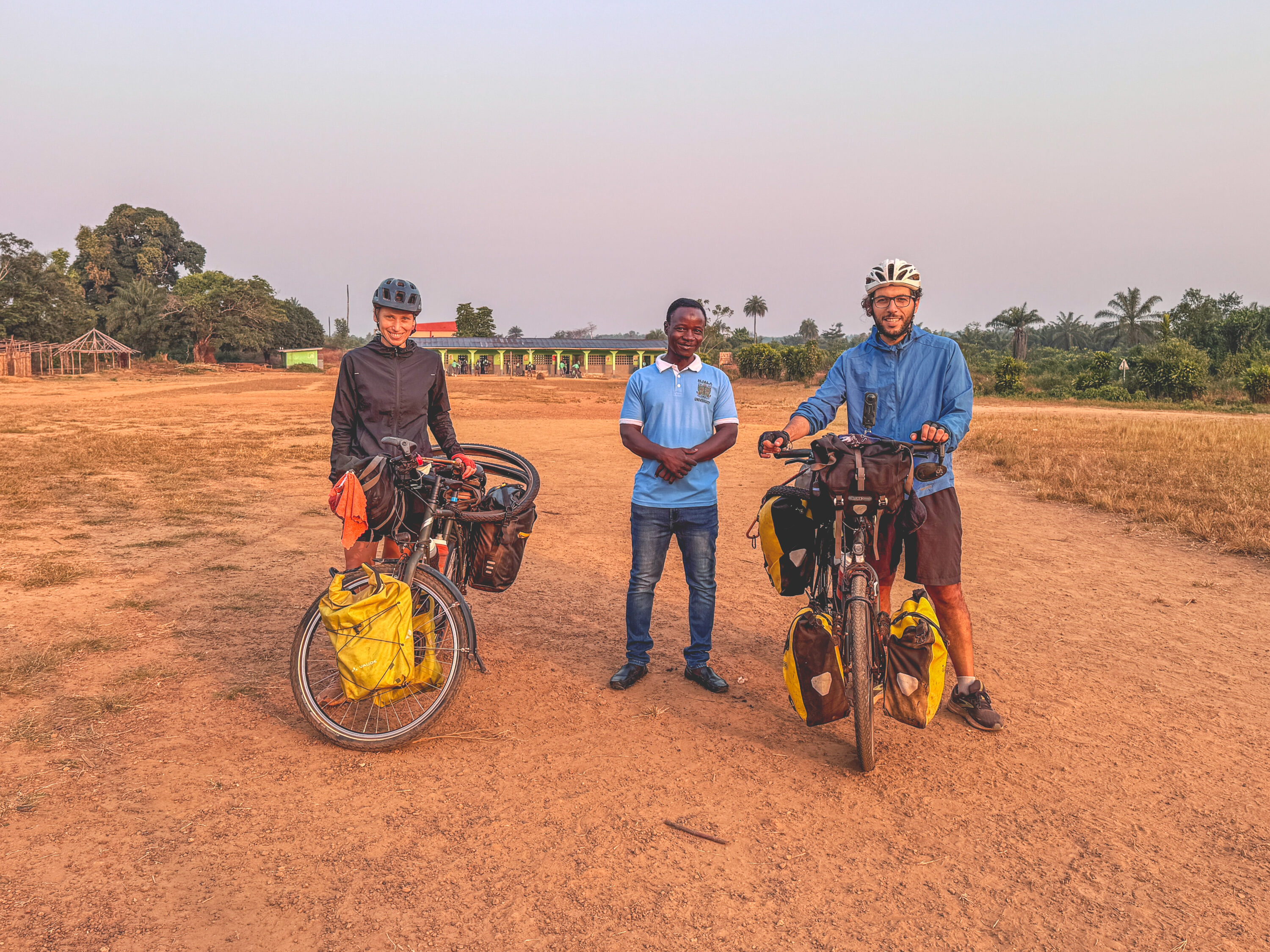
Despite hearing so much about the Sierra Leonean police, I have to say the experience was better than I expected. The passport stamp was quick and smooth—no one asked, “Do you have something for me?”
But just before crossing the bridge to the Liberian side, a man in plain clothes stopped us. He was busy shouting at someone else, then suddenly turned to us.
“I need to check your passports!” he said.
“Who are you?” I asked.
“I’m police. Give me your passport.”
“How can I know you’re police?”
“I’m telling you, I’m police!”
Thankfully, another officer in uniform came over and confirmed he was indeed a police. He explained they needed to check our exit stamps before we left.
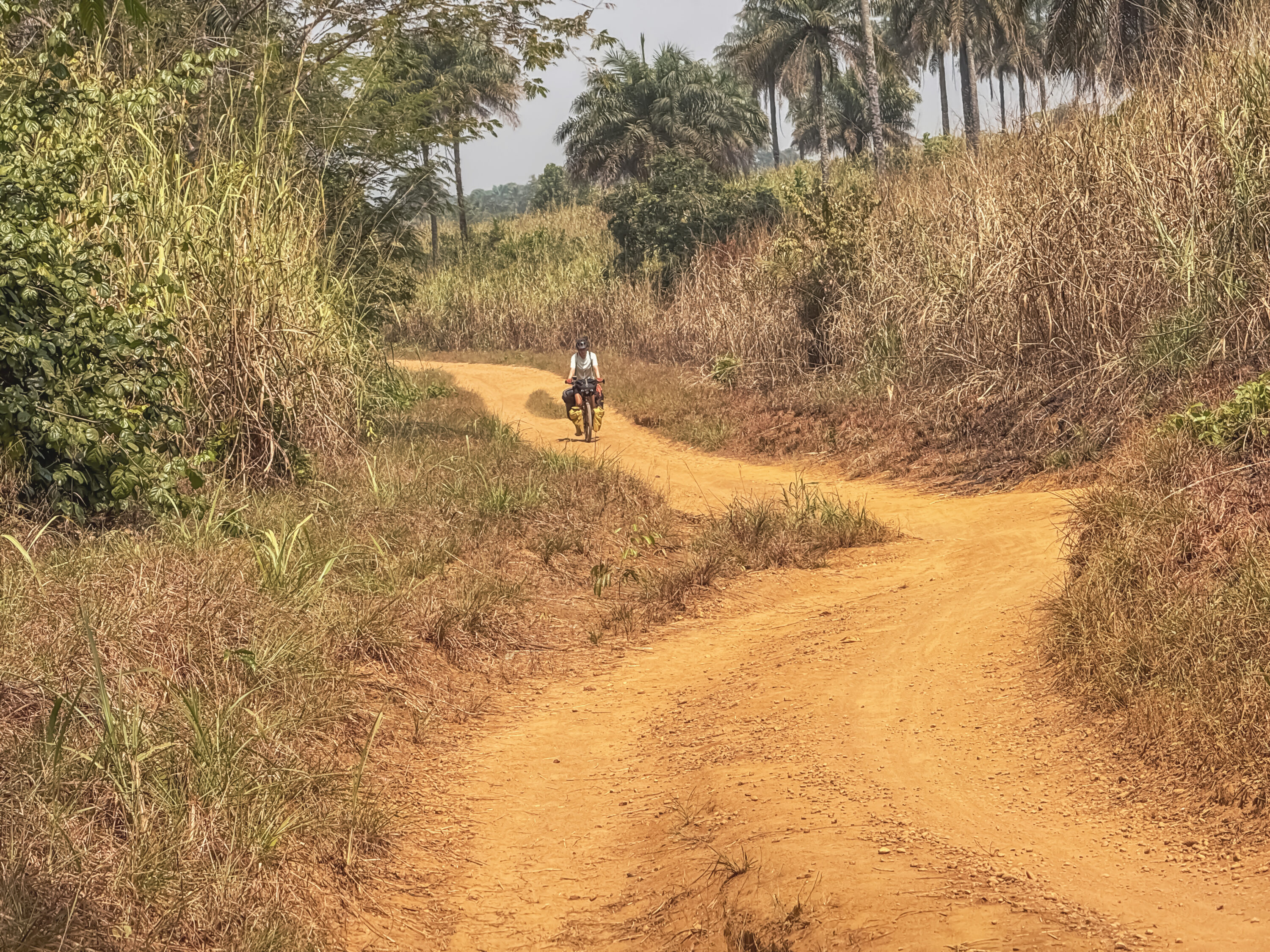
Arriving at the Liberian border felt like arriving at the U.S. border. Everything seemed like a copy-paste of American culture—except for the language, which sounded exactly like drunken English.
One officer checked our passports. Honestly, I don’t know why it feels like everyone has to touch and open your passport, even if they can’t read it or aren’t the person responsible. Eventually, an officer pointed us to the right place to get our entry stamp.
From what I had heard, getting through is always a bit of a gamble. Every officer seems to have their own interpretation of visa rules. Even though we paid $100 each for a 3-month visa at the Liberian embassy in Conakry, we were only given one month at the border.
Asking why we only got one month doesn’t help. They know the rule. This is the rule.
Some travelers told me they only got 15 days and had to pay extra and bribe officers to extend their visa in Monrovia.
As usual, the next mission is the same as always: find a SIM card, exchange money, and find food. then head it to our Target Today Robert Sport.
I’ve noticed I usually get better exchange rates when I swap money before crossing into a new country. Exchanging for Liberian dollars while still in Sierra Leone was better. Same with changing CFA francs into Guinean francs while I was still in Senegal. So far, that strategy has worked well.
But right now, we’re running low on cash and need to find an ATM—hopefully in Robertsport.
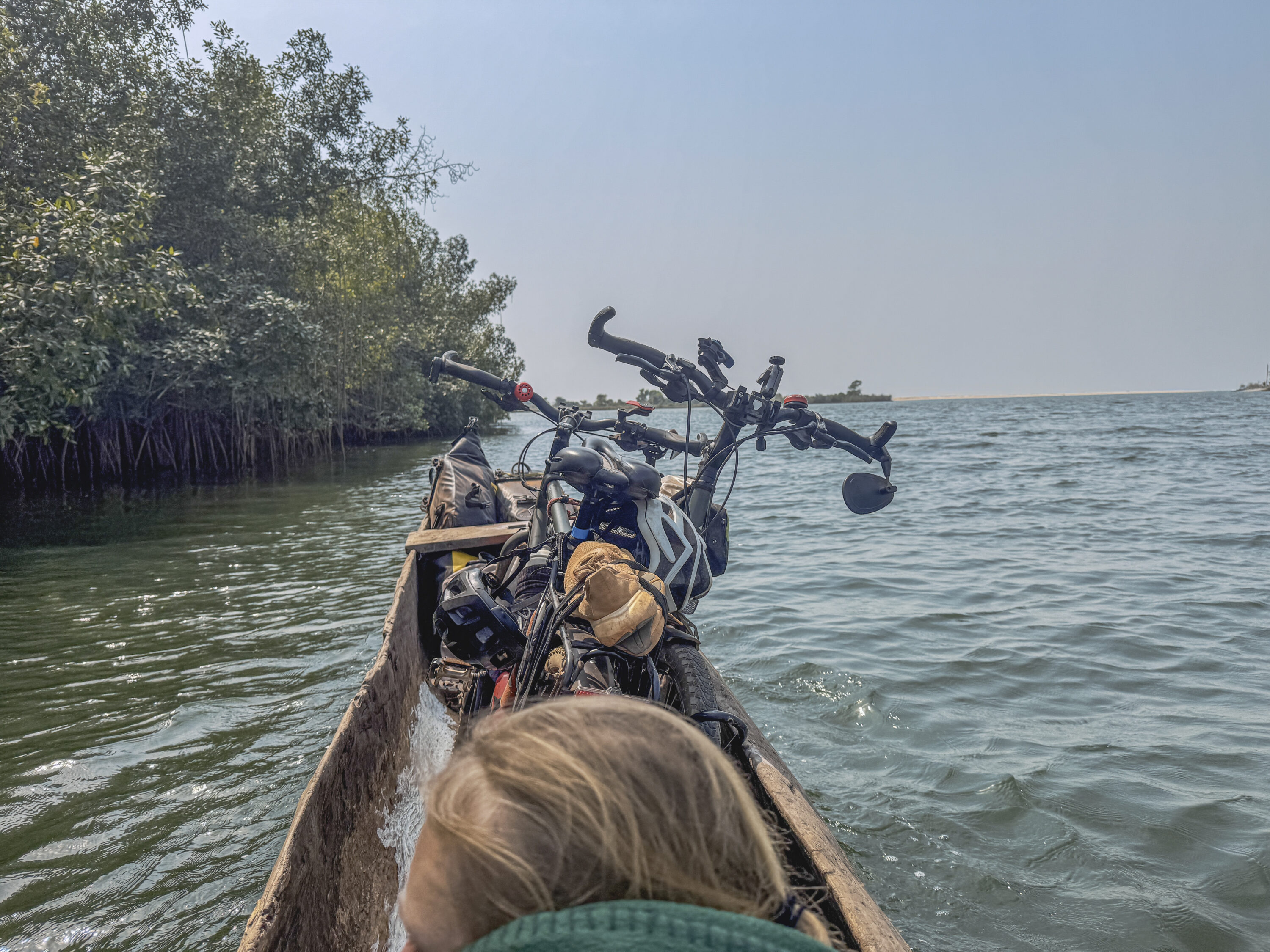
Following a gravel road—sometimes turning into sandy stretches—we made our way to a small village called Saweiloe, where we could take a pirogue to Robertsport.
As soon as we entered the village, a man greeted us and immediately offered to take us across—for $35 USD (7,500 LD). The actual price? 500 LD.After explaining that we weren’t rich white tourists, they finally agreed on 1,500 LD (about $7.50 USD) for both of us, including our bicycles.
The trip was enjoyable, taking in the mangroves and the serene surroundings. However, there were moments when I could clearly see us and the bikes submerged in water. The pirogue measures 40 cm in width and 3 meters in length. At times, the water would be deep, and occasionally one of the men had to disembark and push the pirogue through the sand.

After two hours, we arrived in Robert Sport and were greeted by three men who asked us to accompany them to the chief of the immigration office. I asked if they could show us their credentials before we went with them to the immigration office.
The boss welcomed us and asked for our passports. He was just an ordinary man in a casual office, dressed casually himself, asking for identification. He showed us his ID and started checking our passports and visas.
He took out a magnifying glass to examine the visa closely. “Sorry, but this is a Senegal entry stamp that you are checking,” I pointed out.
“Where is your visa? Where did you get it in Conakry?” he asked.
“Why did you come here by pirogue?”
“Is it not allowed to visit your beautiful city?” I replied.
“Why didn’t you take the road?”
“It’s over a 200 km detour,” I explained.
“But the pirogue is dangerous.”
“And now you have a problem.”
“What problem?”
“You took a dangerous pirogue.”
“What should we have taken to get here?”
“The pirogue.”
“Which one? Is there any other option we should consider?”
“No, no, but we are afraid for your safety; imagine if you end up in the water—no one will know.”
“But how do locals get transportation?”
“Pirogues.”
“Then why shouldn’t we take the same pirogue? How else could we get here if there’s only one way?”
Officer: “Okay, how much did you pay for the pirogue?”
“Sorry officer, do we have to tell you this?”
“Yes, I’m an immigration officer.”
The officer began to become aggressive, clearly trying to extort money from us and looking for anything wrong just so he could blackmail us. We were starting to feel really annoyed; this was only our first day and we had never even mentioned needing assistance from an embassy before.
Officer: “Thanks for taking care of our security, but what does the price of the pirogue have to do with our safety?”
Officer: “How much money do you have?”
“Did we do anything wrong?”
“No.”
“Could we please have our passports back? We need to continue on; otherwise I’ll call the German embassy directly.”
He handed over our passports without hesitation and said apologetically that he was just worried about our safety.
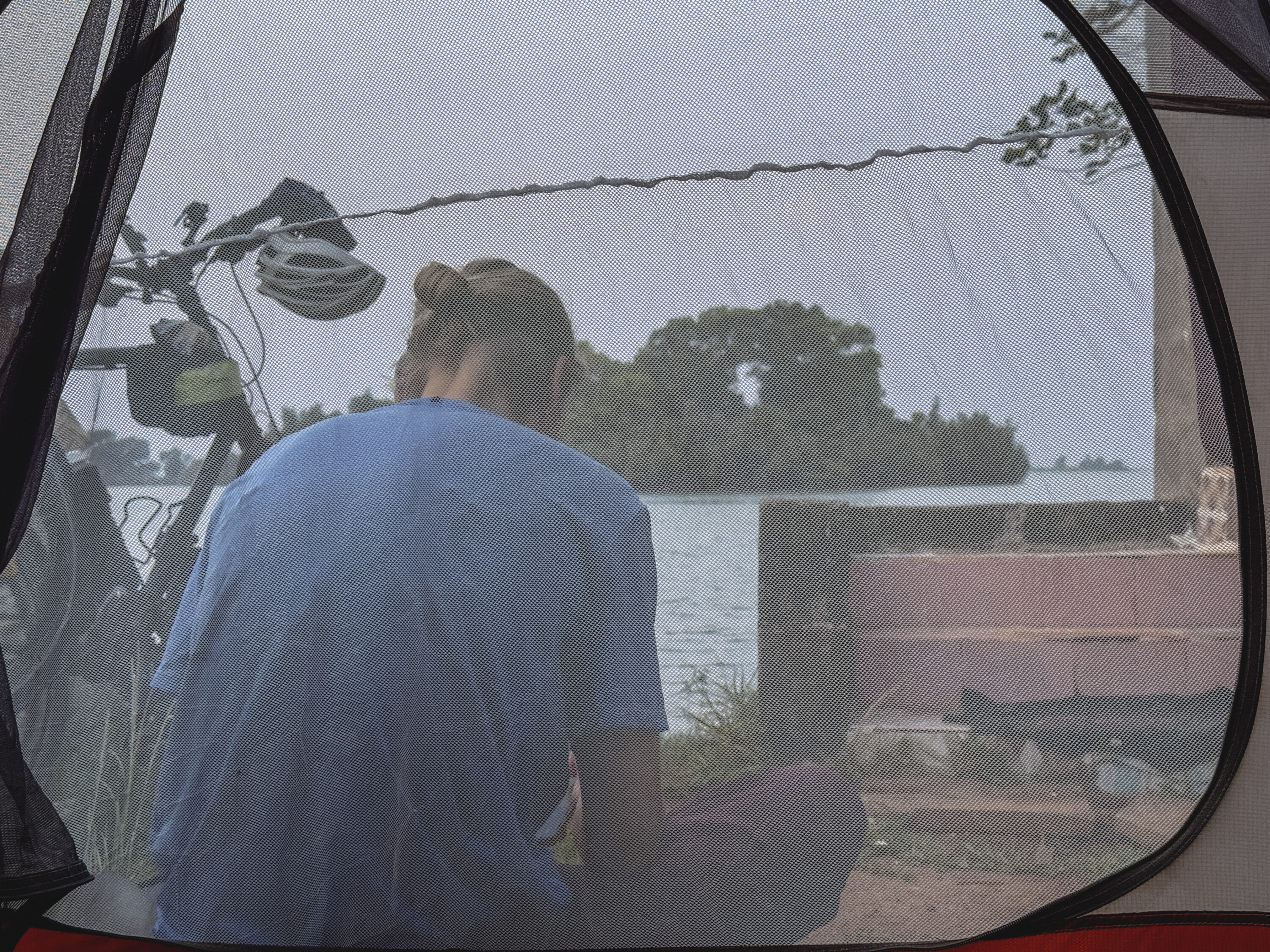
We were on the hunt for a SIM card, but it seemed like we hit a snag. The only shop in town had a Lonestar SIM card, and he wanted 2,500 LD for what’s usually free.
Just then, someone overheard our search for the official store and pointed us towards an Orange shop. Unfortunately, the person in charge of sales wasn’t around; he’d be back tomorrow.
We considered leaving, but there was no way we could head out without a SIM card—the next big stop was Monrovia! I asked the guy if he was certain we could get the SIM tomorrow, and he assured me we could.
and ended up bringing us to his home right in front of the Orange shop—perfectly situated by the lagoon!
The night was miserable. An extremely loud music started at 10 PM, around 700 meters from our tent, where we could barely hear ourselves inside. I tried to ask what it was about but got no answer; it sounded like a normal occurrence in Liberia.
At 1 AM, the music was still going strong, making it impossible to sleep. Out of curiosity, I went over to see what they were celebrating and found two men sitting on a speaker and drinking beer. around 4 am the music stopped.
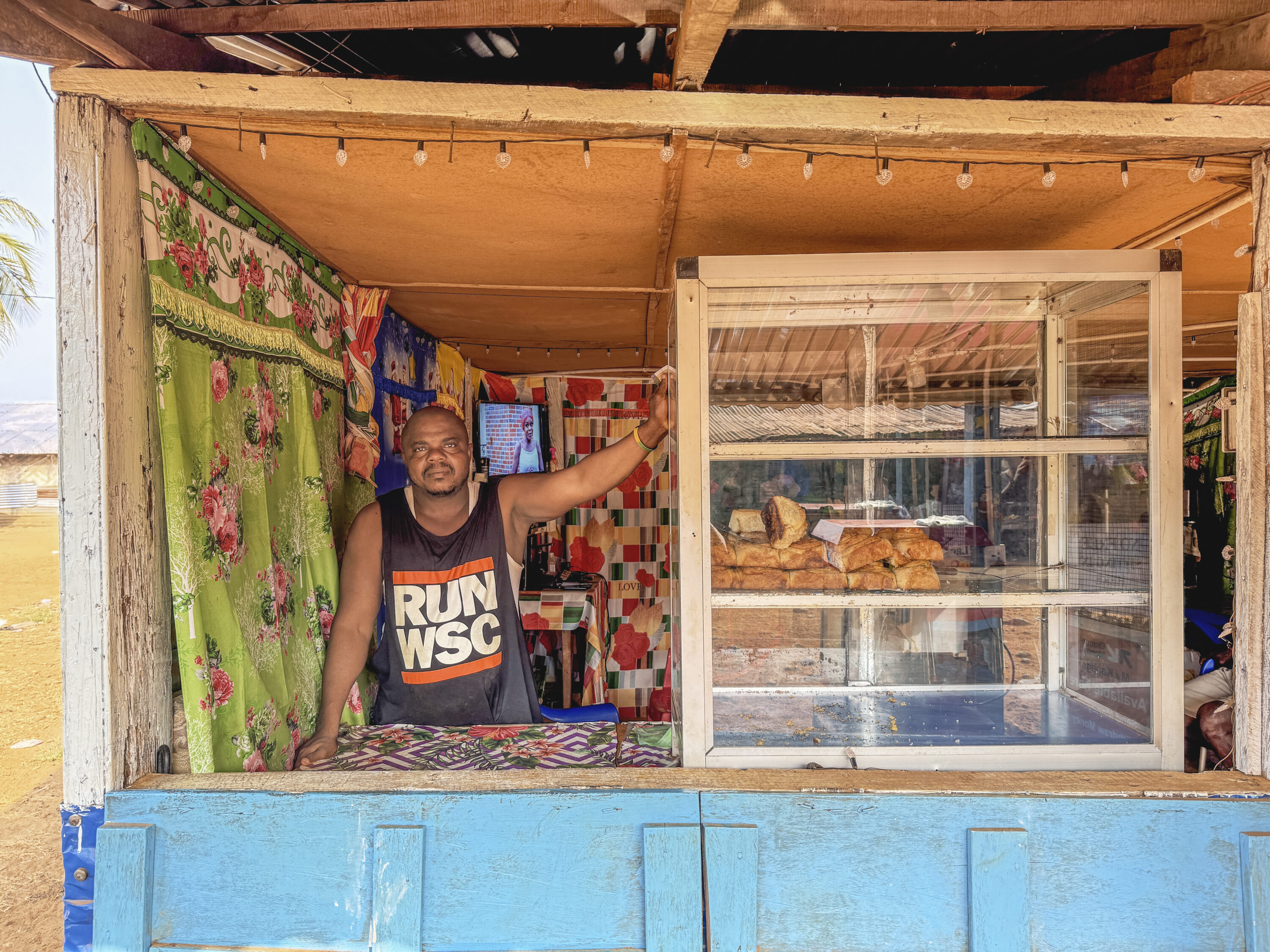
The next day, we visited what is supposedly the best bakery in the area. After having breakfast, we returned to Orange’s shop to buy a SIM card. It took longer than usual to register the SIM card, and it was almost noon by the time we finished, which made the day perfect for a short cycling trip.
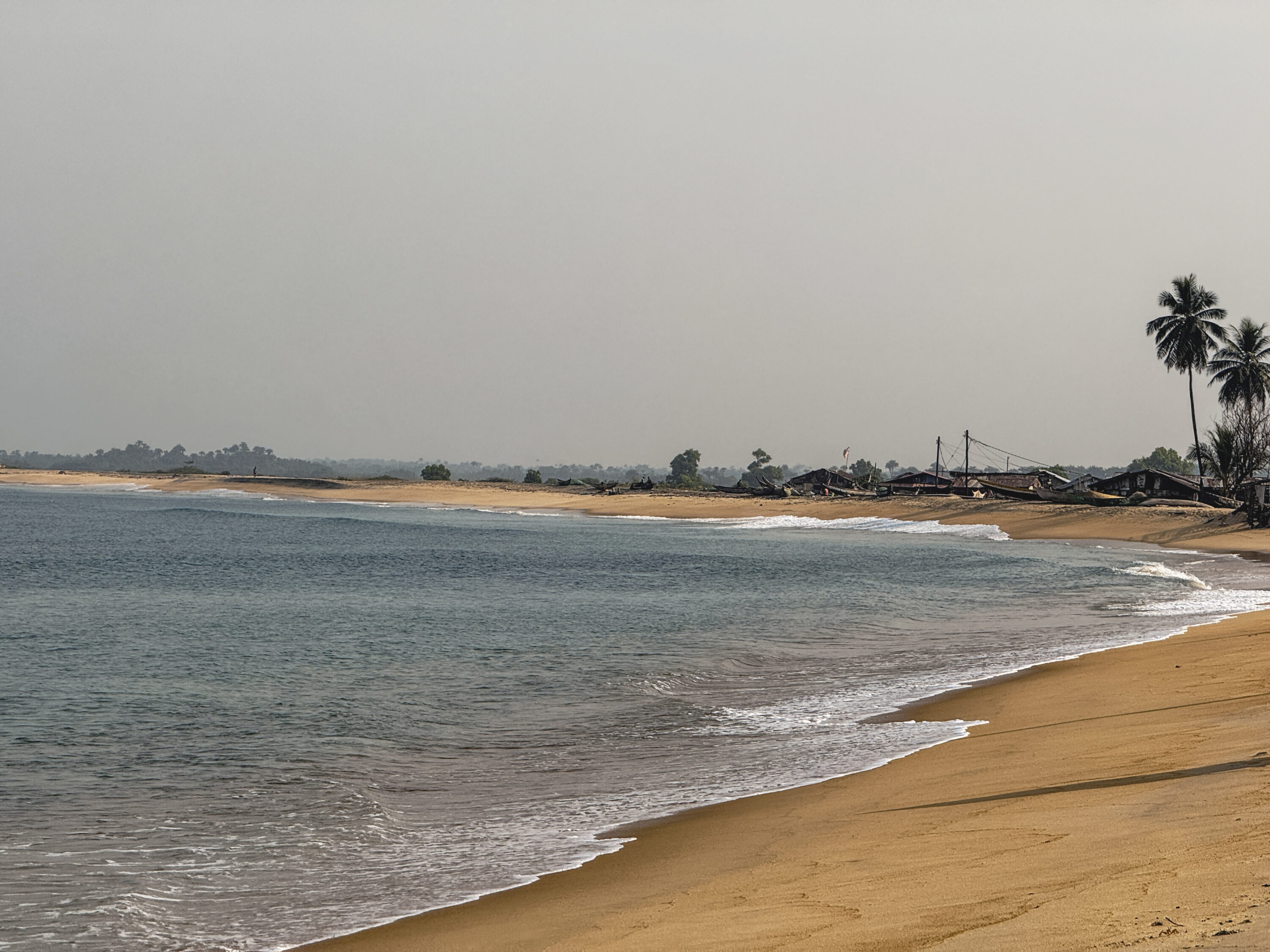
We continued on to Klay, where we hoped to find an ATM. About 20 km outside of Robertsport, we wanted to take a short break for half an hour, but there was nowhere to rest except in the nearby village. A woman welcomed us, and we asked if it was possible to find some shade from the sun for a brief respite. She replied that it would cost us $60 for half an hour, which is the average income of a Liberian person. The chief of the village then approached us after hearing about our cycling journey and our request for a short break. He agreed to let us rest for a while.
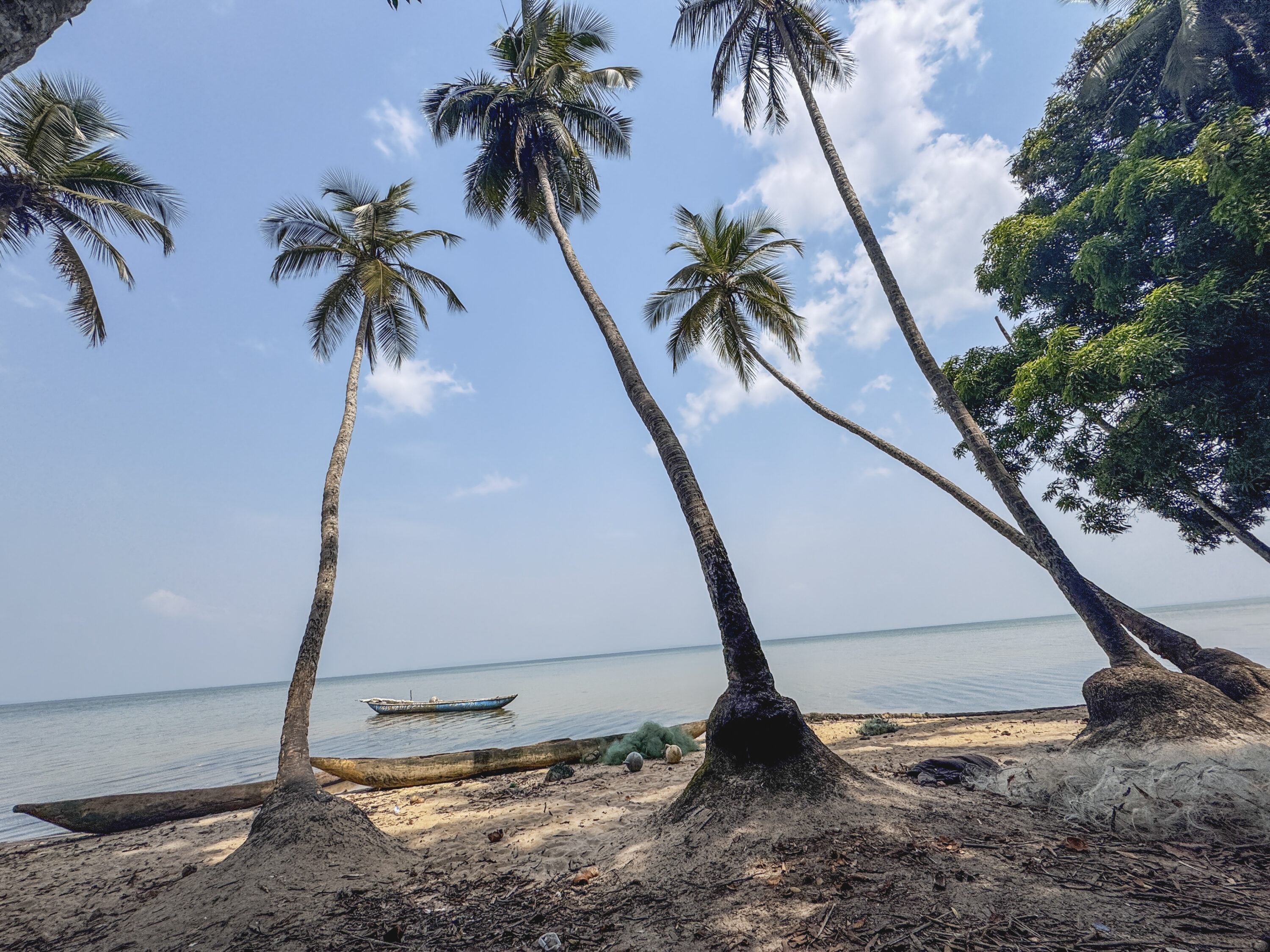
The break ended up being shorter than planned because we were surrounded by people. The chief came over to take my number, and a few minutes later, some guys sat down in front of me while I was trying to close my eyes for a little sleep. When I opened my eyes, I saw them staring at me. Then, some kids came over asking, “Uncle, gimmee Monee,” so we decided to leave.
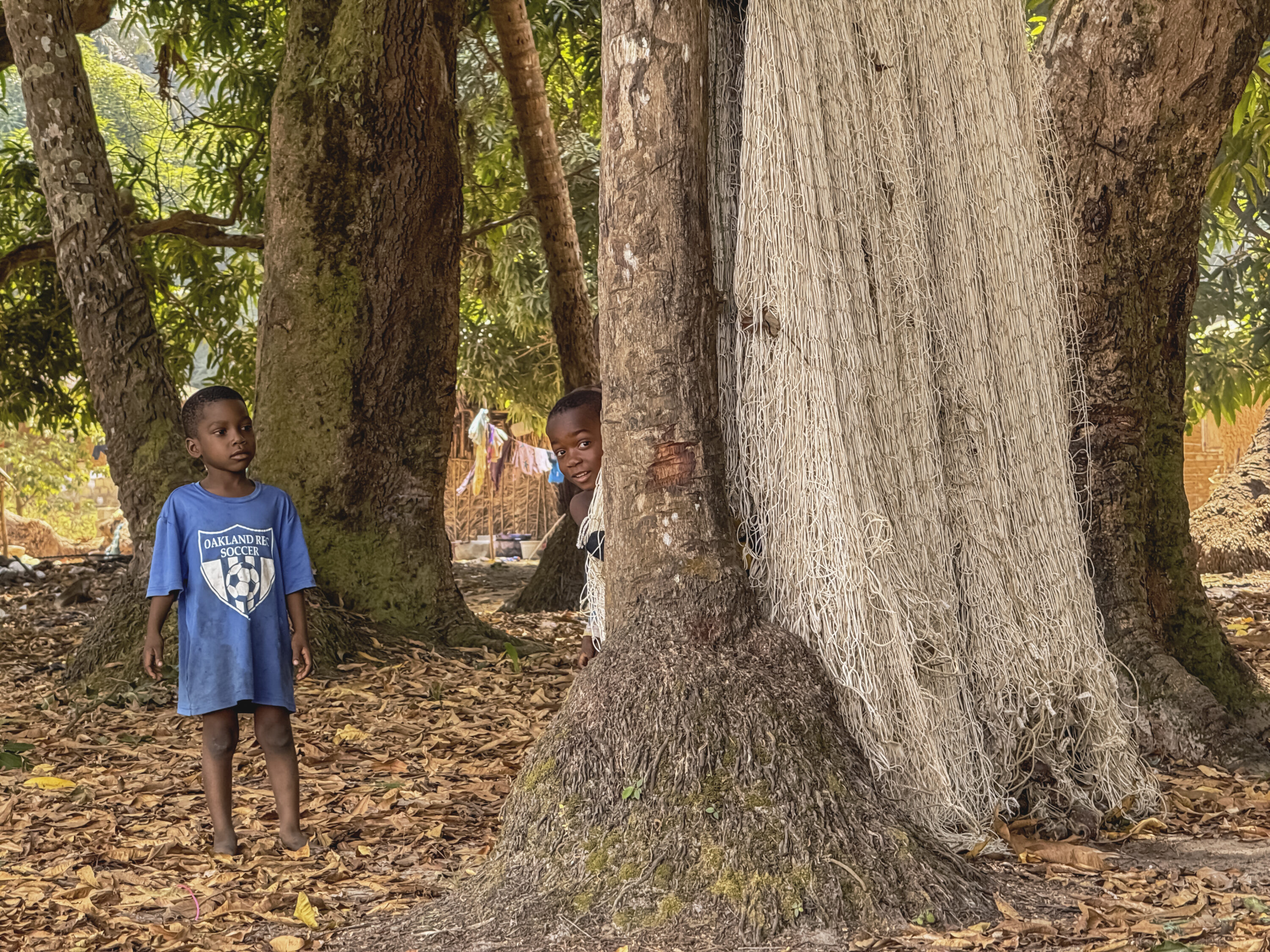
On the way, an open gate led to the lake Piso with two buildings. A woman sitting on a terrace close to the lake was preparing fish to be smoked and sold. She brought her daughter to translate for us. This is the house of former President of Liberia, Ellen Johnson Sirleaf; she used to come here for holidays or when guests were visiting Liberia.
The place was spacious and calm, with no annoying kids or adults asking for money. They let us camp there for the night.
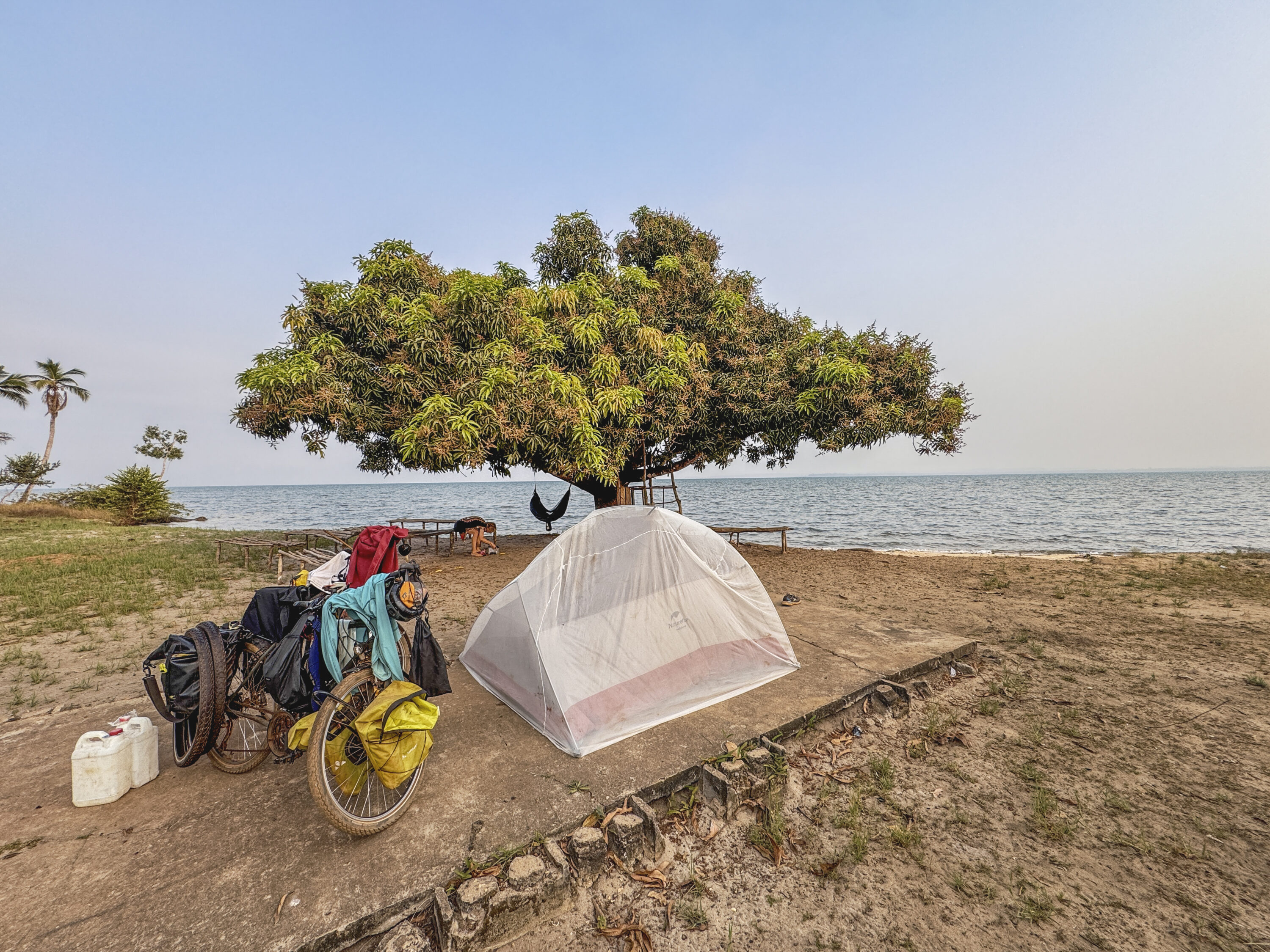
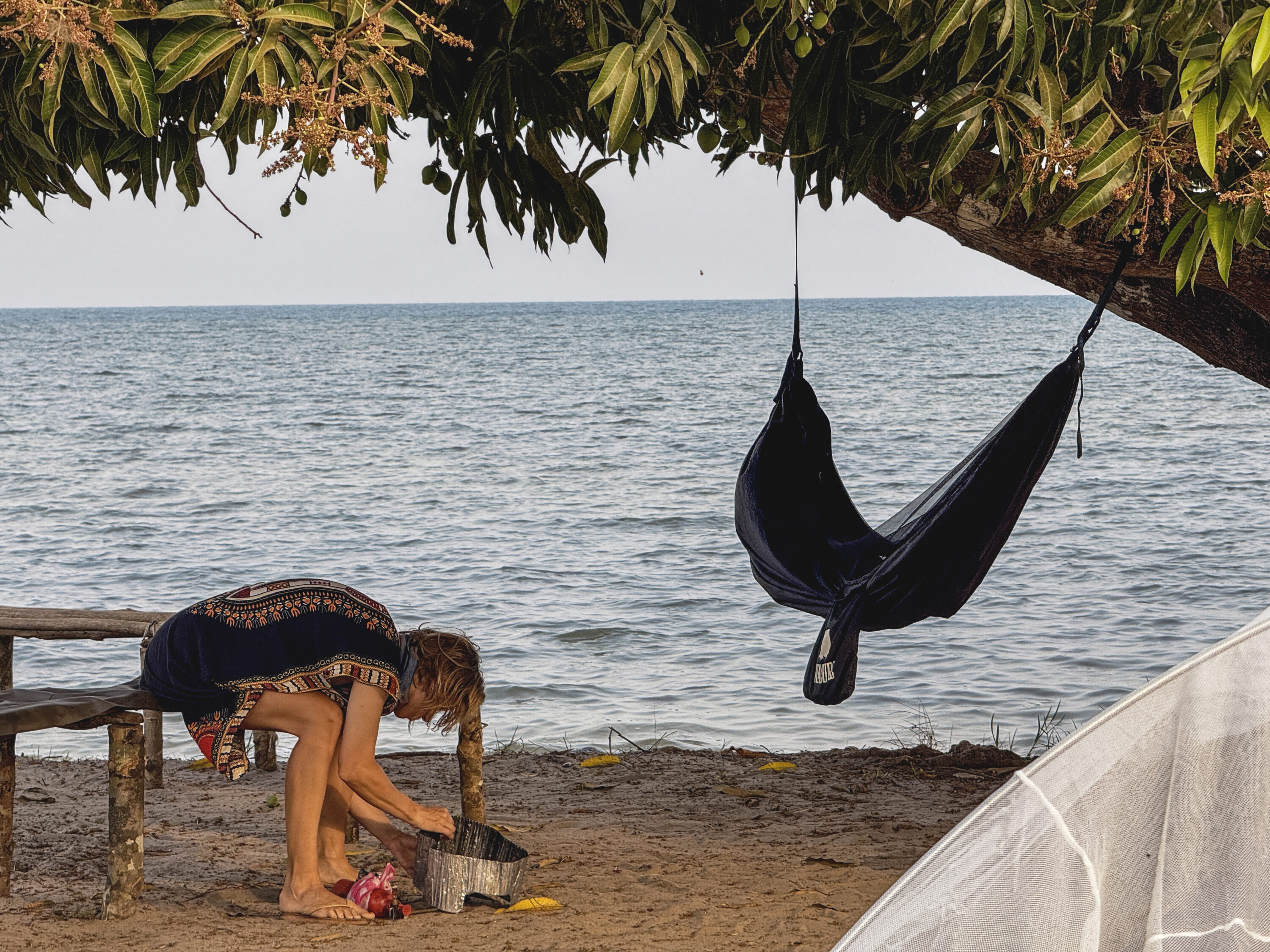
Since our tent was damaged in Sierra Leone, we often woke up at midnight to deal with cockroaches and mosquitoes. The zipper is broken, so our only solution so far has been to cover the entire tent with a mosquito net, which isn’t very effective. This time, we even had a special guest—a huge spider.We have tried various solutions to find a new tent. If someone is coming to Liberia or Sierra Leone soon, they might be able to help us out. We contacted the German embassy in Ivory Coast to ask if we could send a package with a tent to their address, but they replied with a clear no. However, the German embassy in Monrovia agreed to let us send our tent there. Hopefully, we will be able to get a new tent soon!
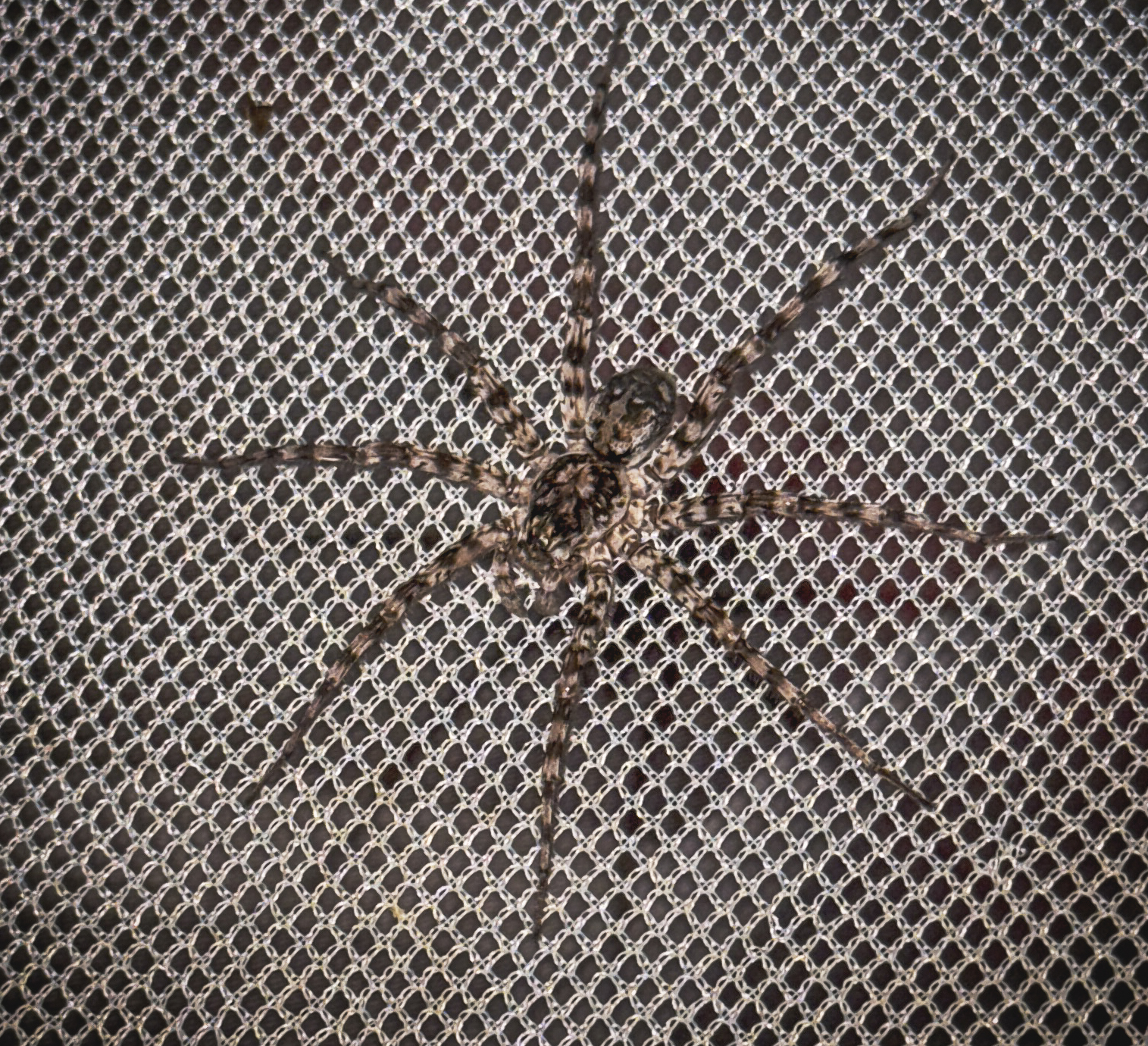
Today, we had a change of plans. We wanted to go to Blue Lake before heading to Monrovia, but our package, which includes the tent, hasn’t even arrived in Monrovia yet. The lake was a mining site long ago, and after the mining operations stopped, it quickly filled with water to become a very deep lake.
Jean Baptist, a cyclist who visited the lake in 2012, could access and swim there. and took nice Photos There.
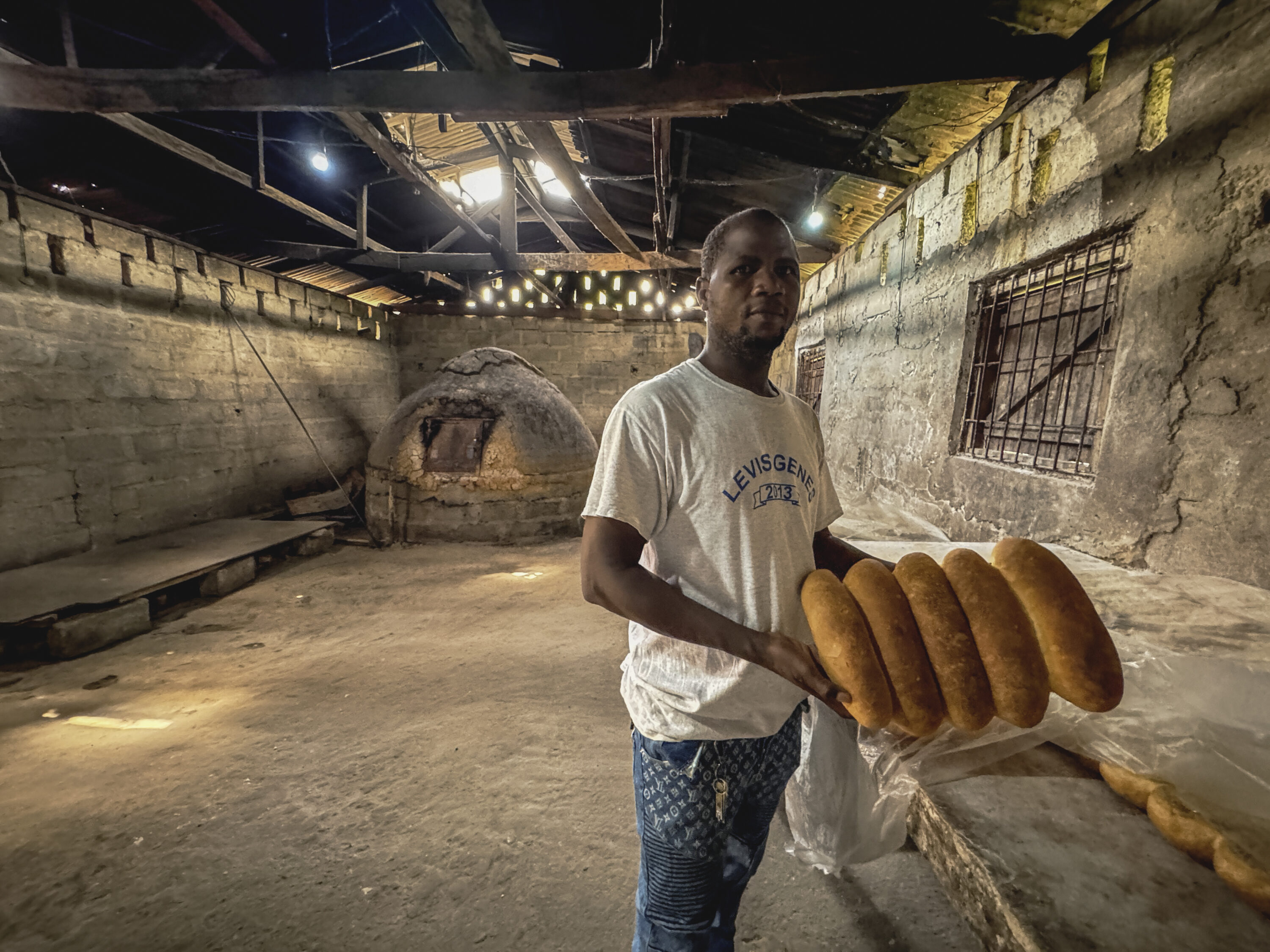
On the way to the lake, the bridge where the Maher Massacre happened 2002 during the liberian Civil war.
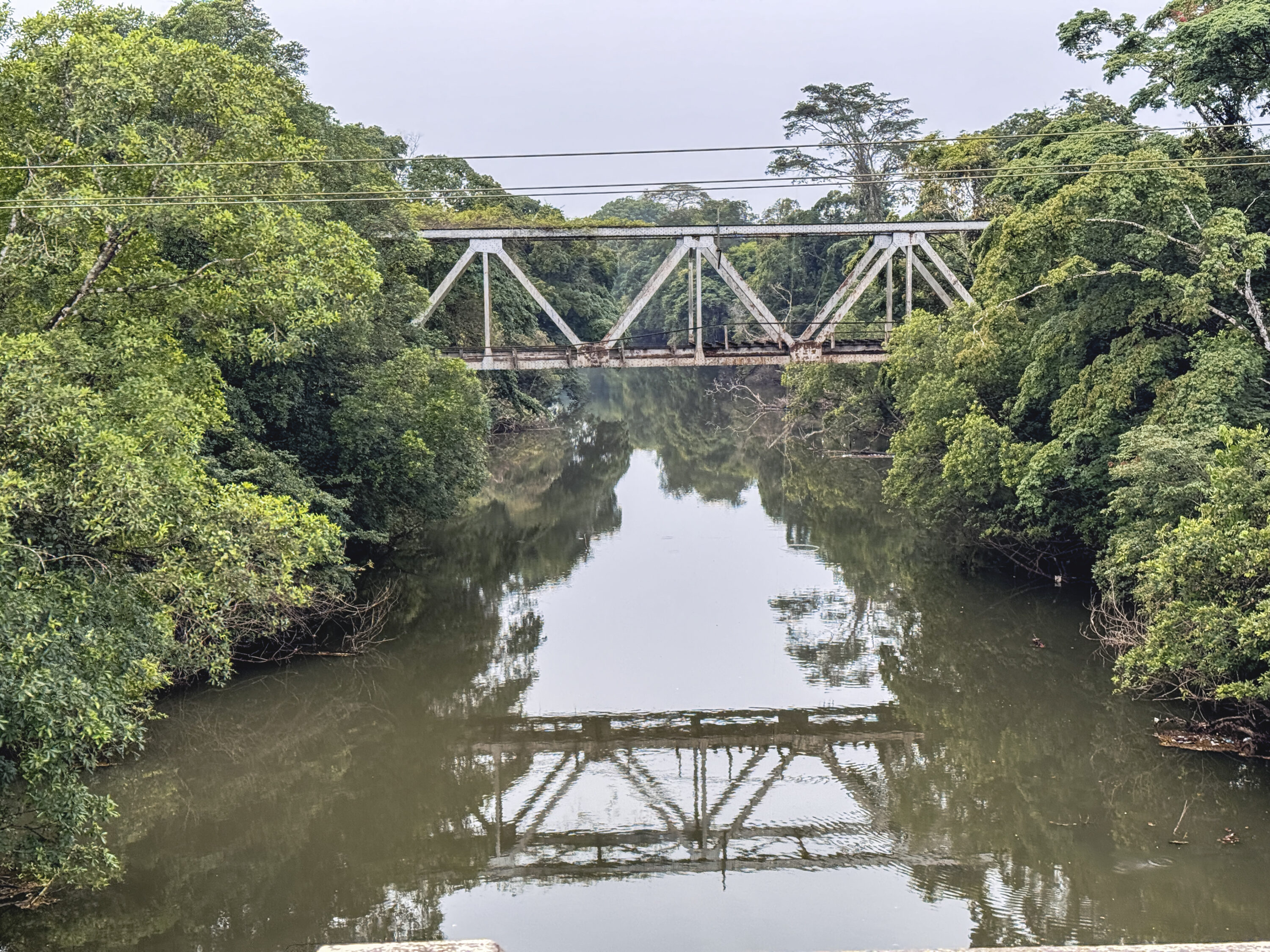
The Maher Massacre (2002) in Liberia saw government forces execute around 175 civilians, falsely accused of aiding rebels. A memorial near the Maher River depicts the tragedy in three panels: the village attack, killings on Maher Bridge, and victims in the river. It is one of 155 documented massacre sites in Liberia.
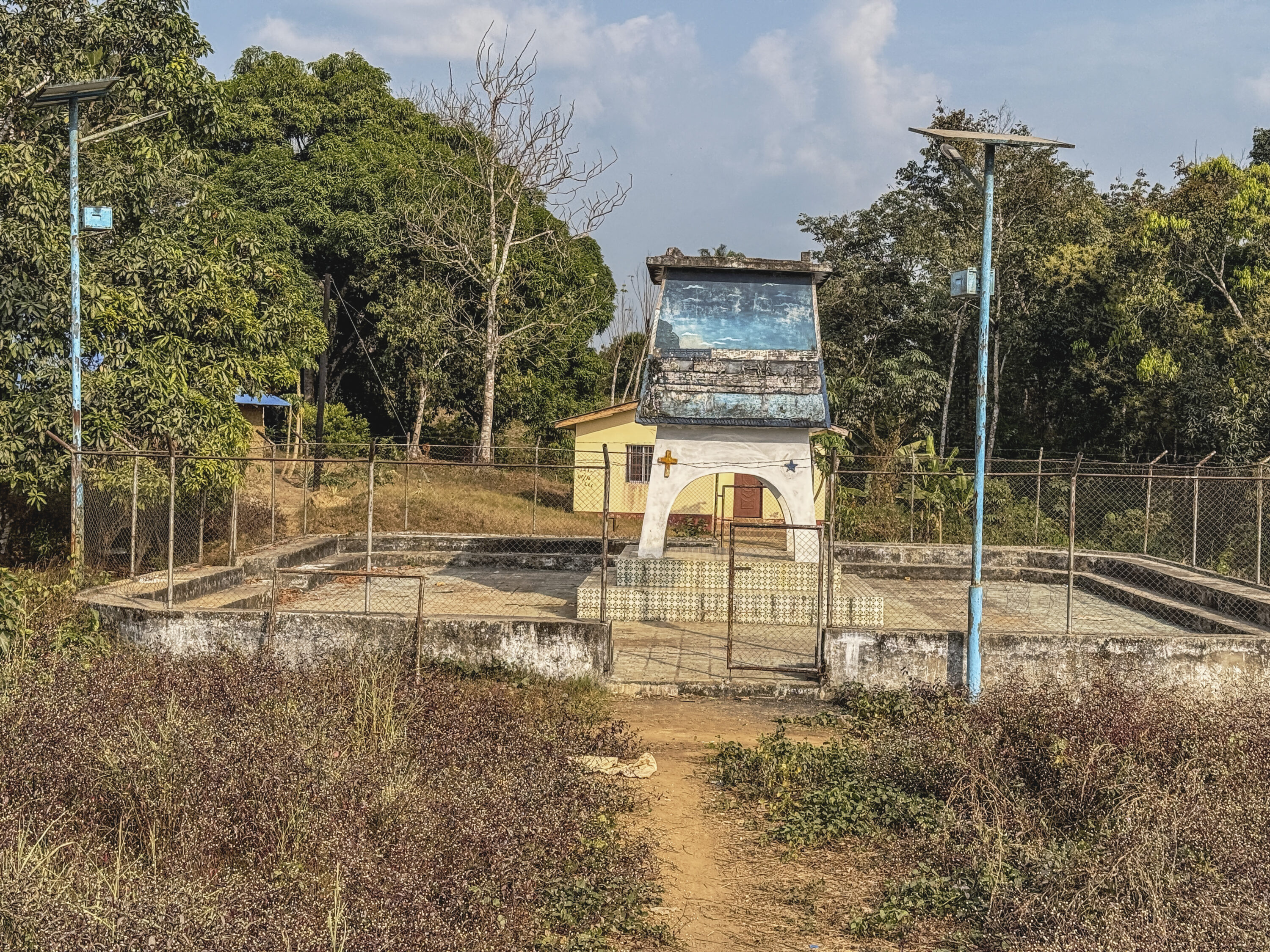
It was late, around sunset, and we still had 3 km to climb to reach the lake. I looked back and saw Sandra stopped by a person in civilian clothes. I went back to check, and it turned out to be an annoying immigration officer again. “What do you want?” I asked. “Passport, please,” he said.
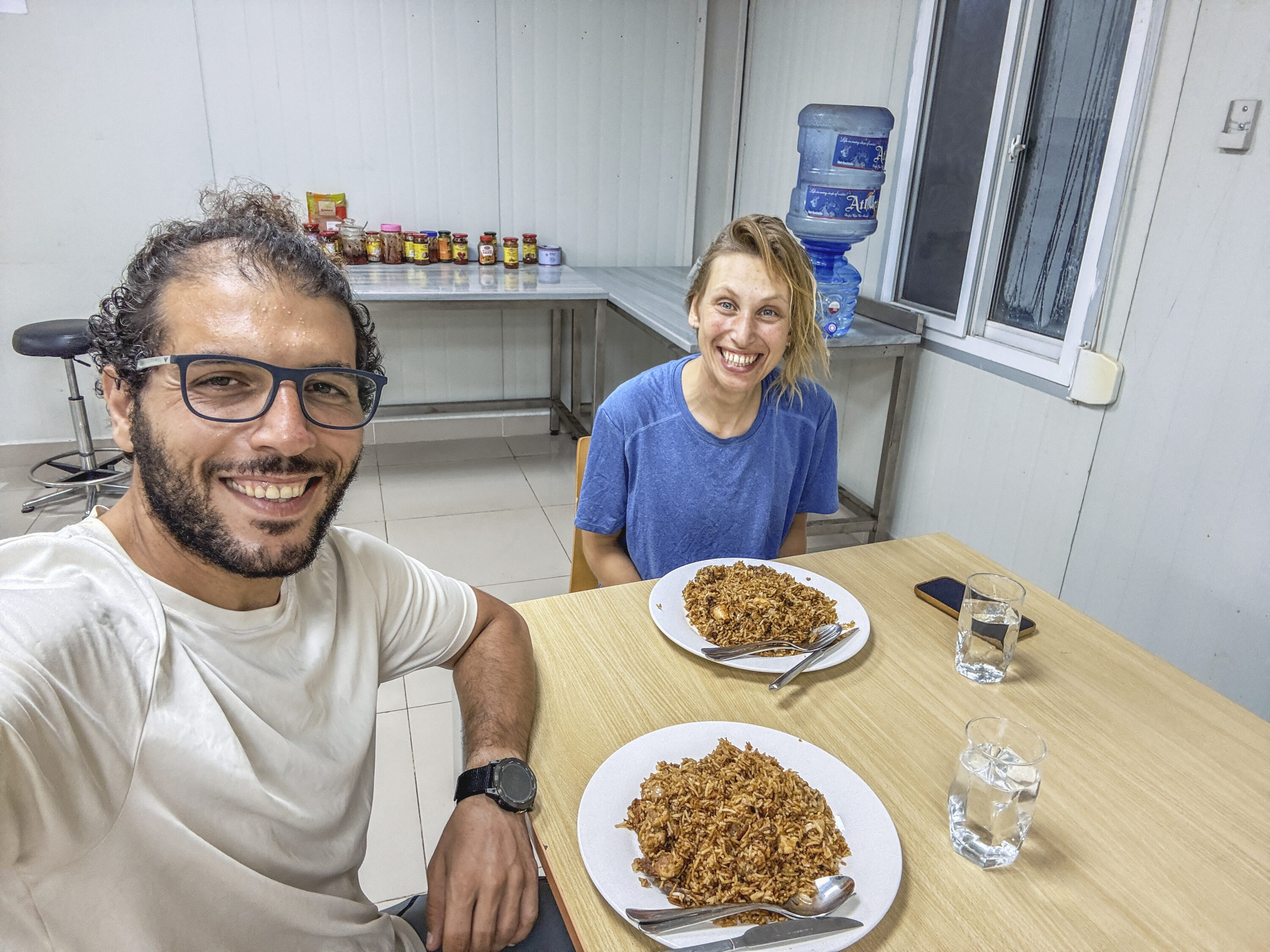
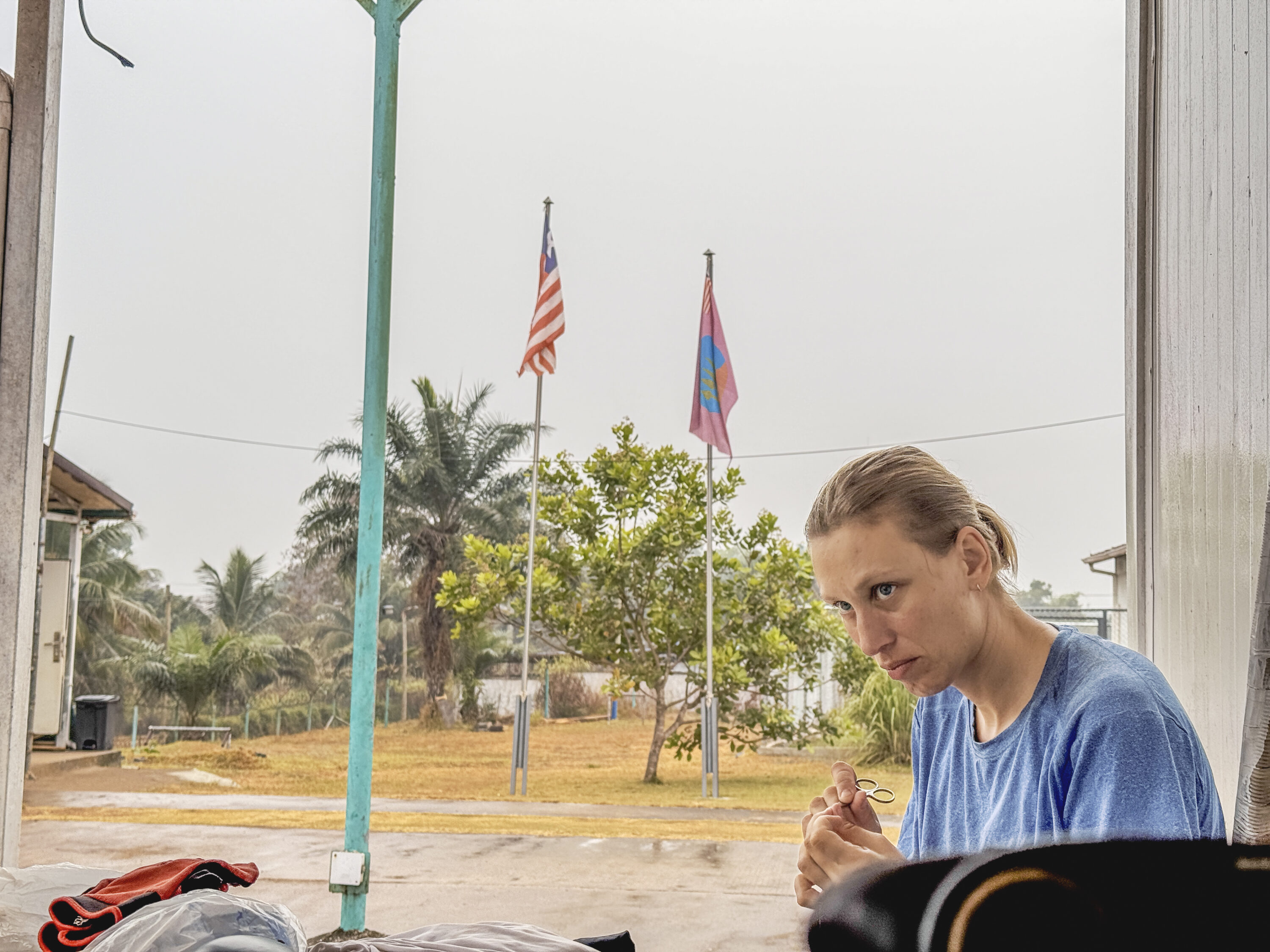
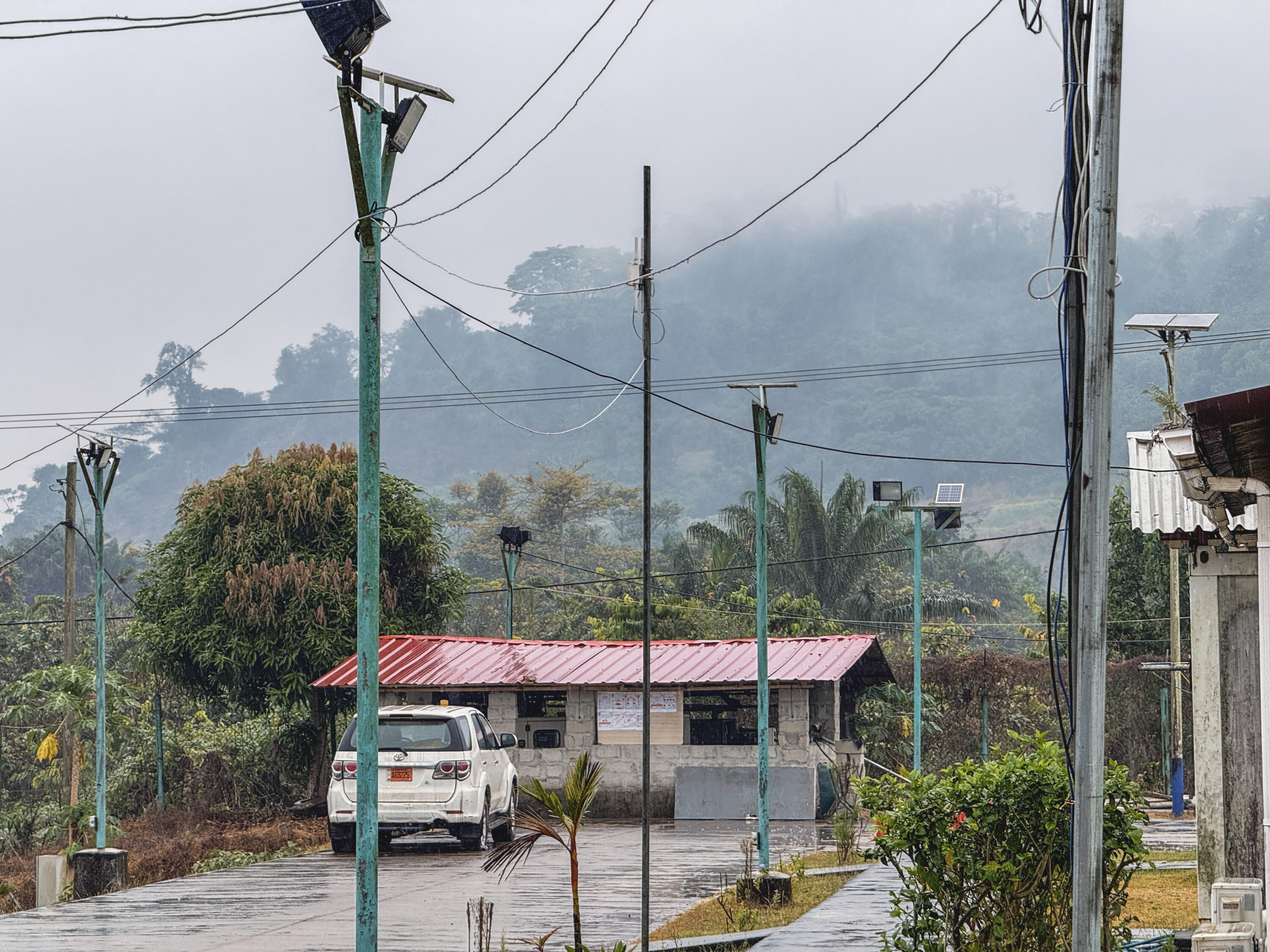
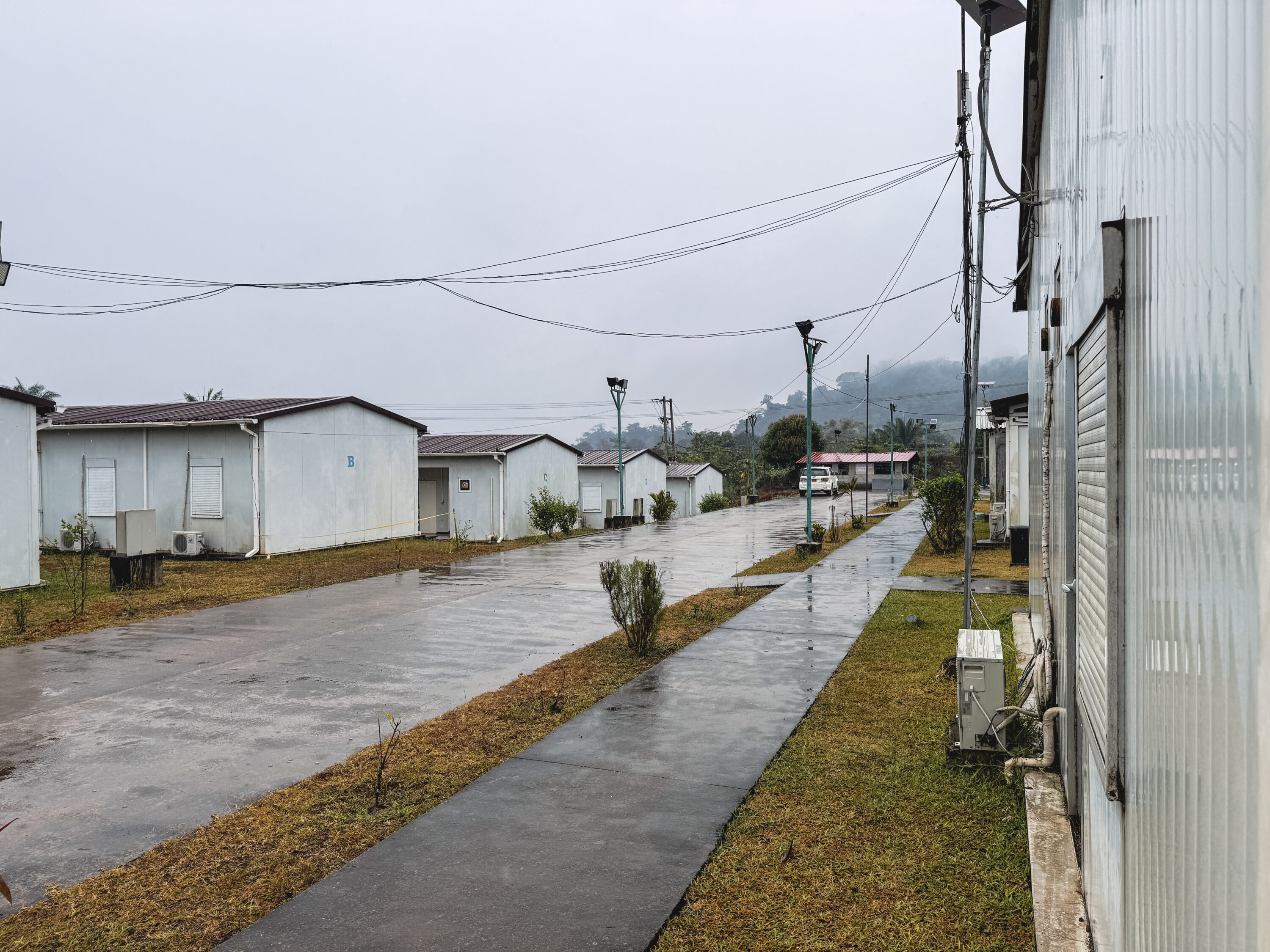
The next day, we had breakfast and prepared to leave when it started to rain heavily. I went to Ansgar and asked him if it was possible to send someone with us to visit the Blue Lake. He called the big boss and received permission for us to go under two conditions: they would drive us there in their car, and we had to leave our phones on campus. We agreed because we wanted to see the lake. Unfortunately, the lake hardly exists anymore; they are draining it into the nearby river, and they will continue mining there probably within a year.
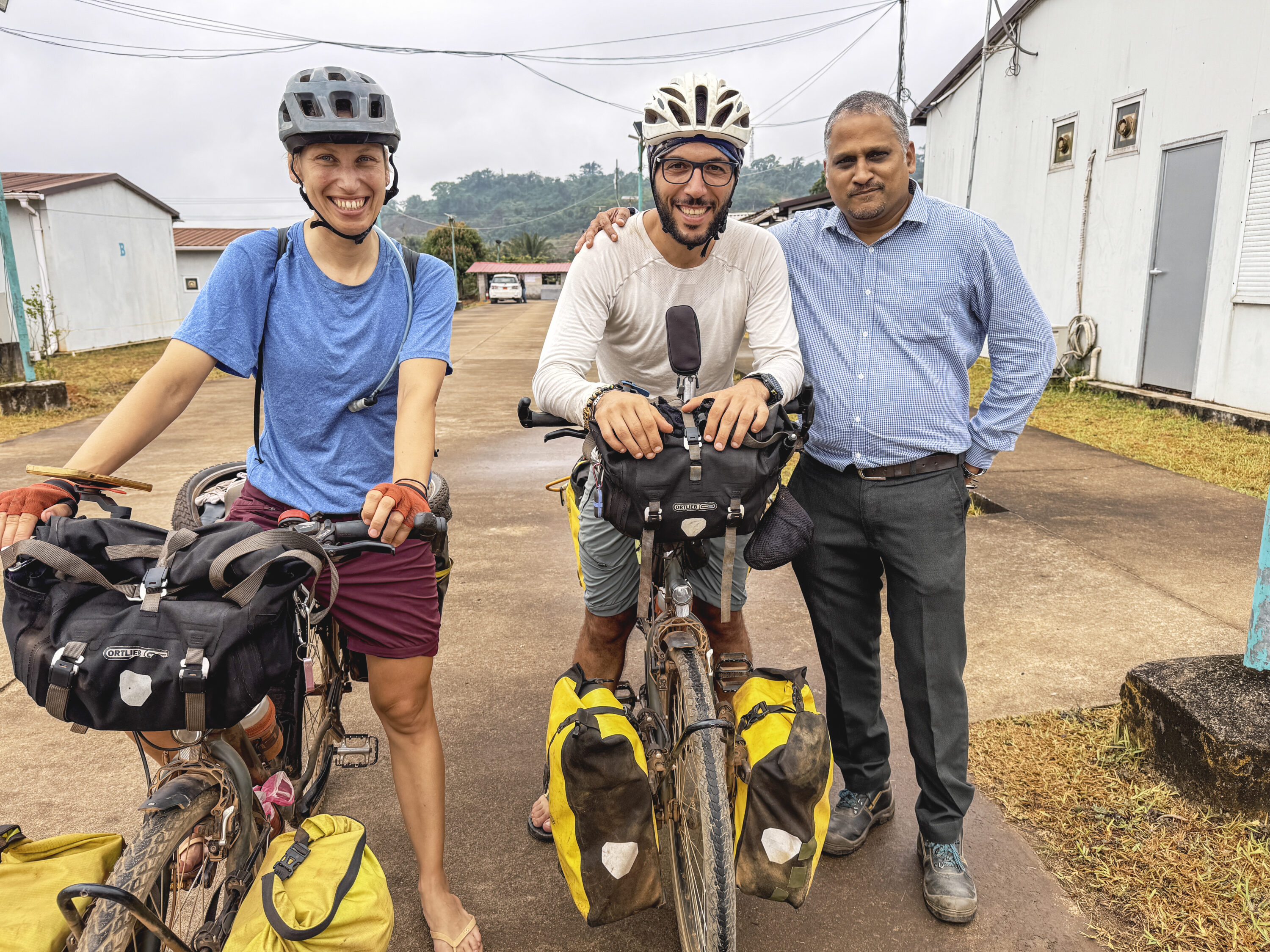
We said goodbye and set off for another day of short cycling. After a while, we arrived at a school and asked if we could spend the night there. They readily agreed. Pastor John, the director of the school and a really funny guy, came by later to say hello. He had lived in the Netherlands for a short time.
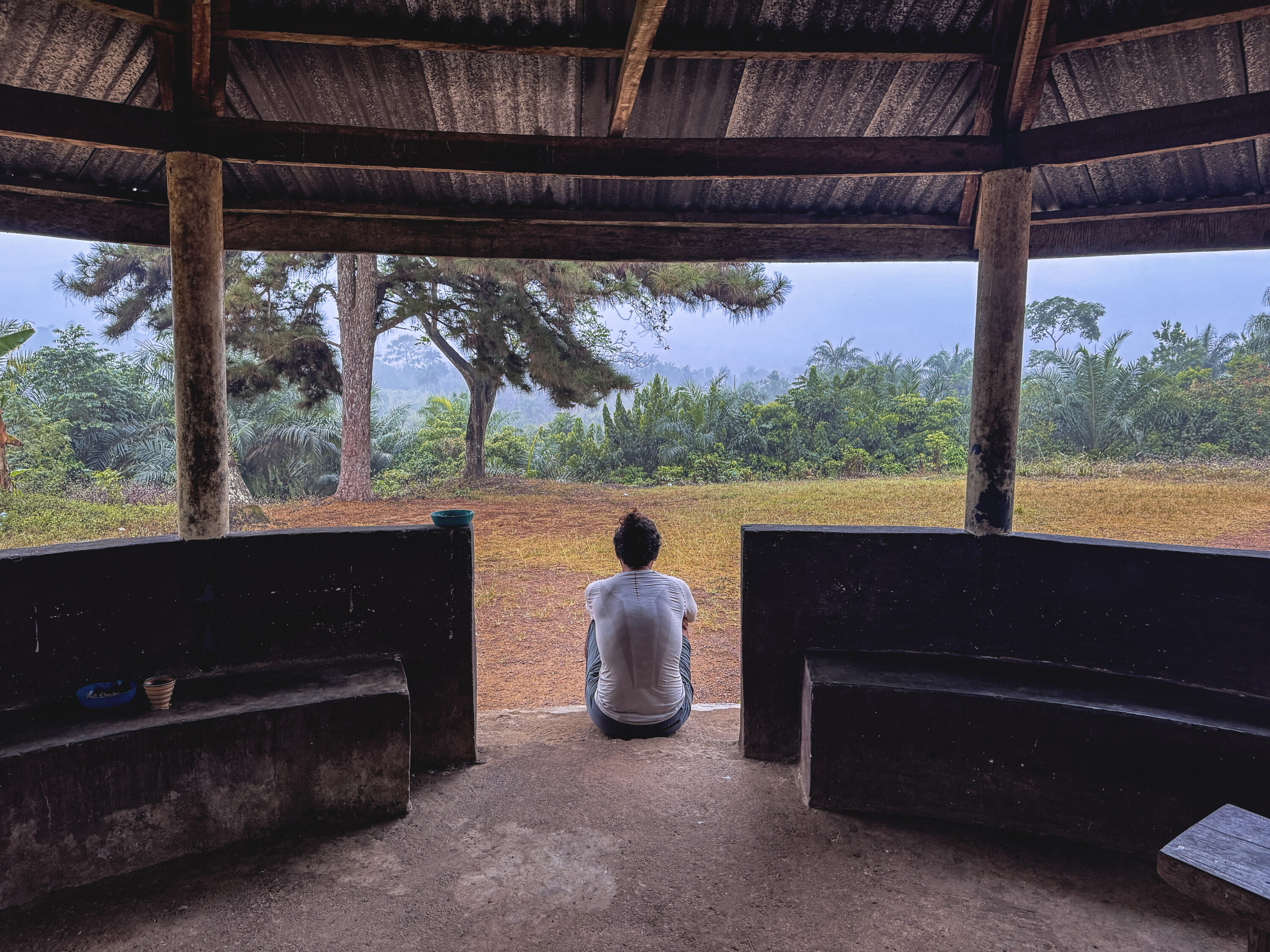
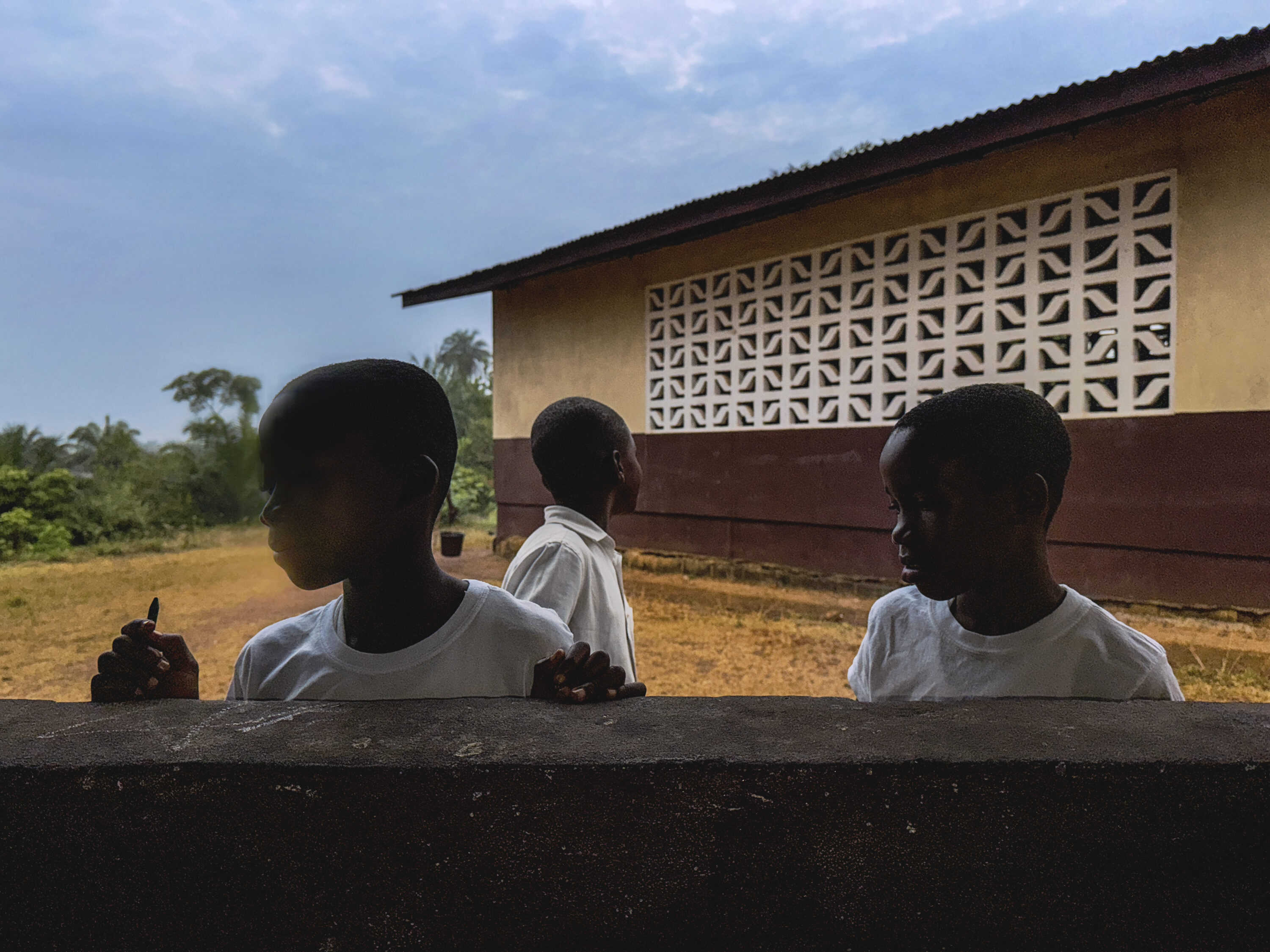
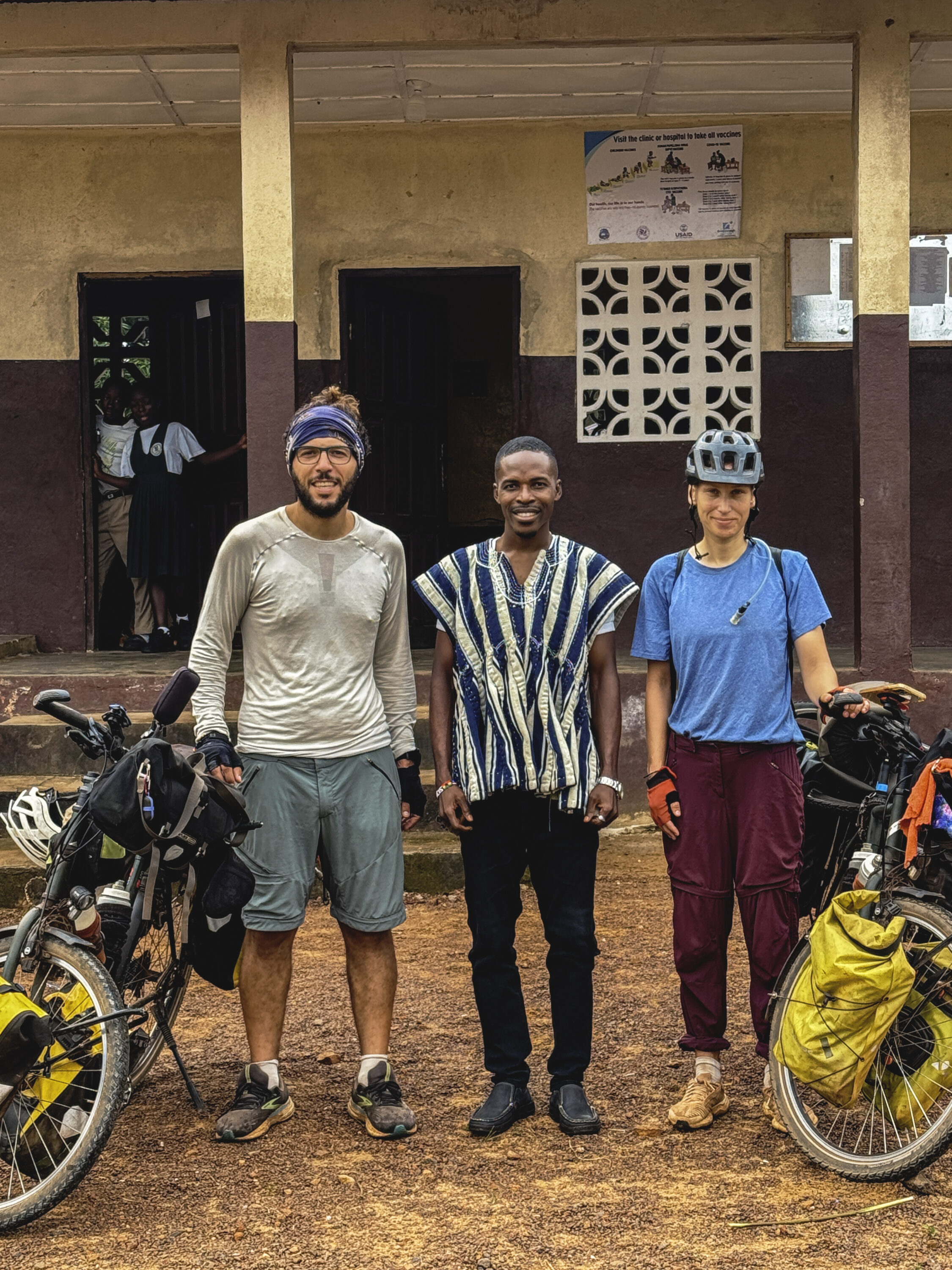
“Pumui” is mostly the word used in Liberia to describe a “white person.” I would say kids in Liberia are generally less annoying than the ones we encountered on the road in Morocco, Mauritania, Senegal, or Guinea.
Kids enjoy taking selfies, and I also enjoy having photos with them, asking about their school and daily life—as long as they’re not constantly begging with “give me something,” but they mostly leave if you say, “I have nothing.”
It often happens that a tiny one-year-old, barely 40 cm tall, comes running toward us, waving and screaming “Pumui” in a high-pitched tone. It feels like a scene from a cartoon, and honestly, it melts the heart.
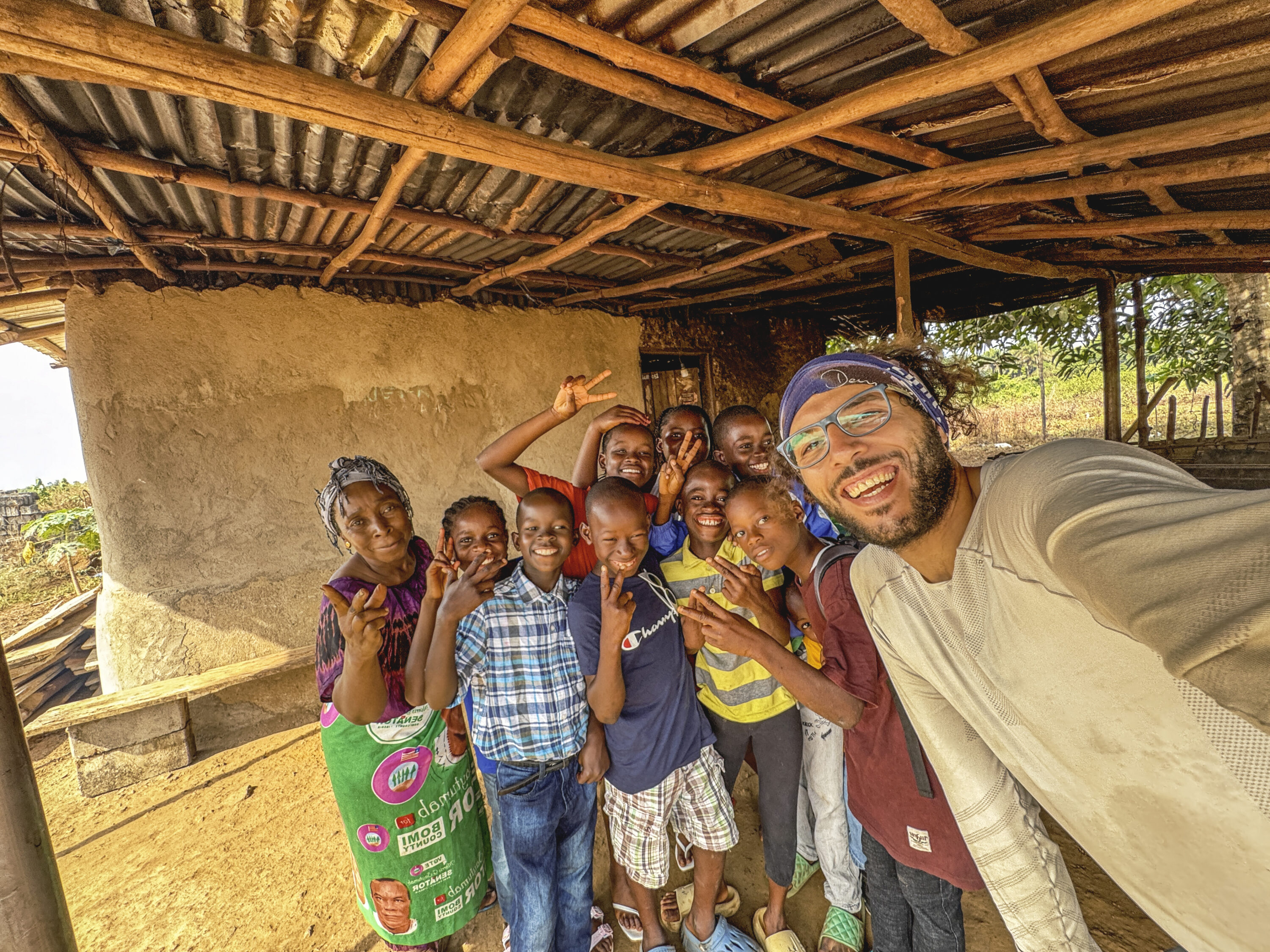
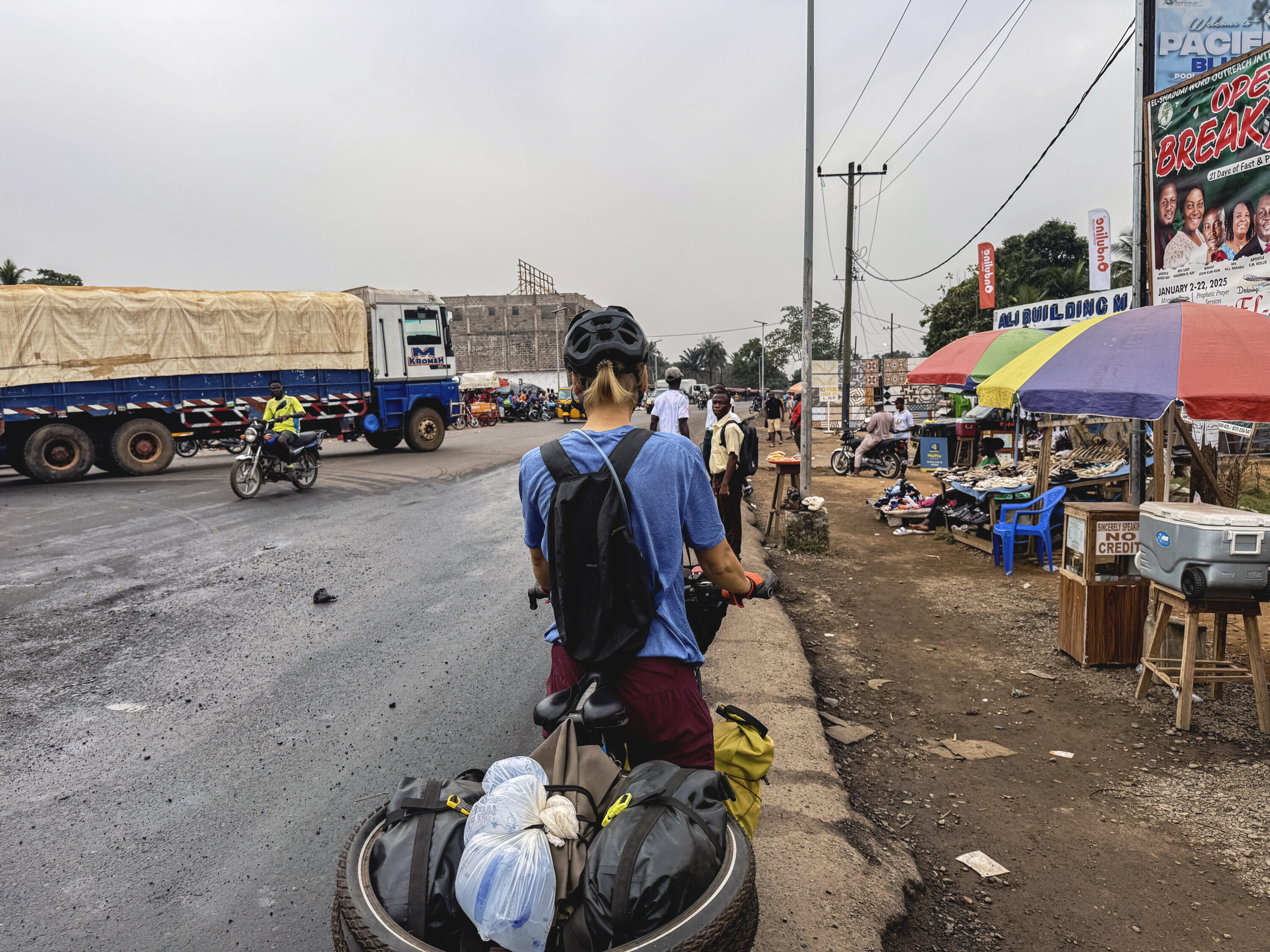
Twenty kilometers before Monrovia, we visited the university and took a short snack break. While there, we met Christopher. His mother is from Vietnam, and his father is from Liberia. We sympathized with him because he feels he doesn’t belong to Liberia or Vietnam. Today’s plan was not to cycle all the way to Monrovia but to find a camping spot nearby and then enter the city early tomorrow morning. Christopher insisted on inviting us to his home. I asked him if he was sure because the sun was setting in an hour, and we needed about an hour and a half to arrive to his place. We didn’t want to risk being out too late. He assured us that we were welcome.We cycled to his apartment but couldn’t reach him when we called. The area was busy and somewhat unsettling, resembling a red-light district. After twenty minutes, he arrived and explained that his landlord didn’t agree to let us stay. “But the landlord is your parent,” I said.”Sorry, no. it’s not.”
But my aunt is here, and she has a home that could accommodate you,” he replied.He then guided us through some unfamiliar places, asking people if we could pitch our tent. We even went to a church, but the people there were quite annoyed From him. We were unsure if he truly wanted to help us but couldn’t for some reason, which made the situation confusing.
we feel we are getting manipulated for some mysterious reasons, and we needed to make a quick decision, so we stopped him and left to find a place to spend the night. After a few kilometers, we stopped to ask about the local school. A man named Daniel on the road took us inside the community school, where we met Pastor Moses Russell, who oversees the school.
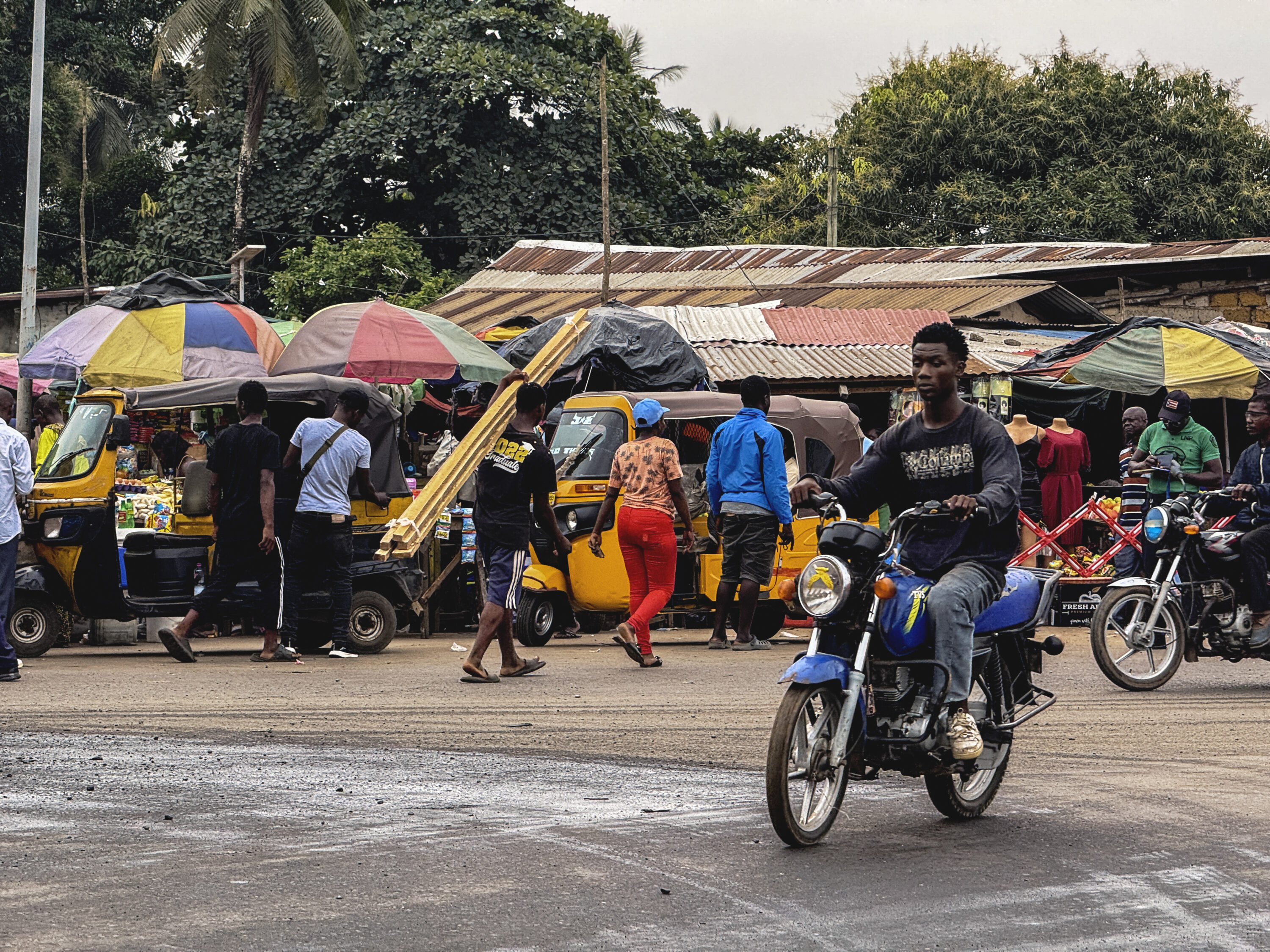
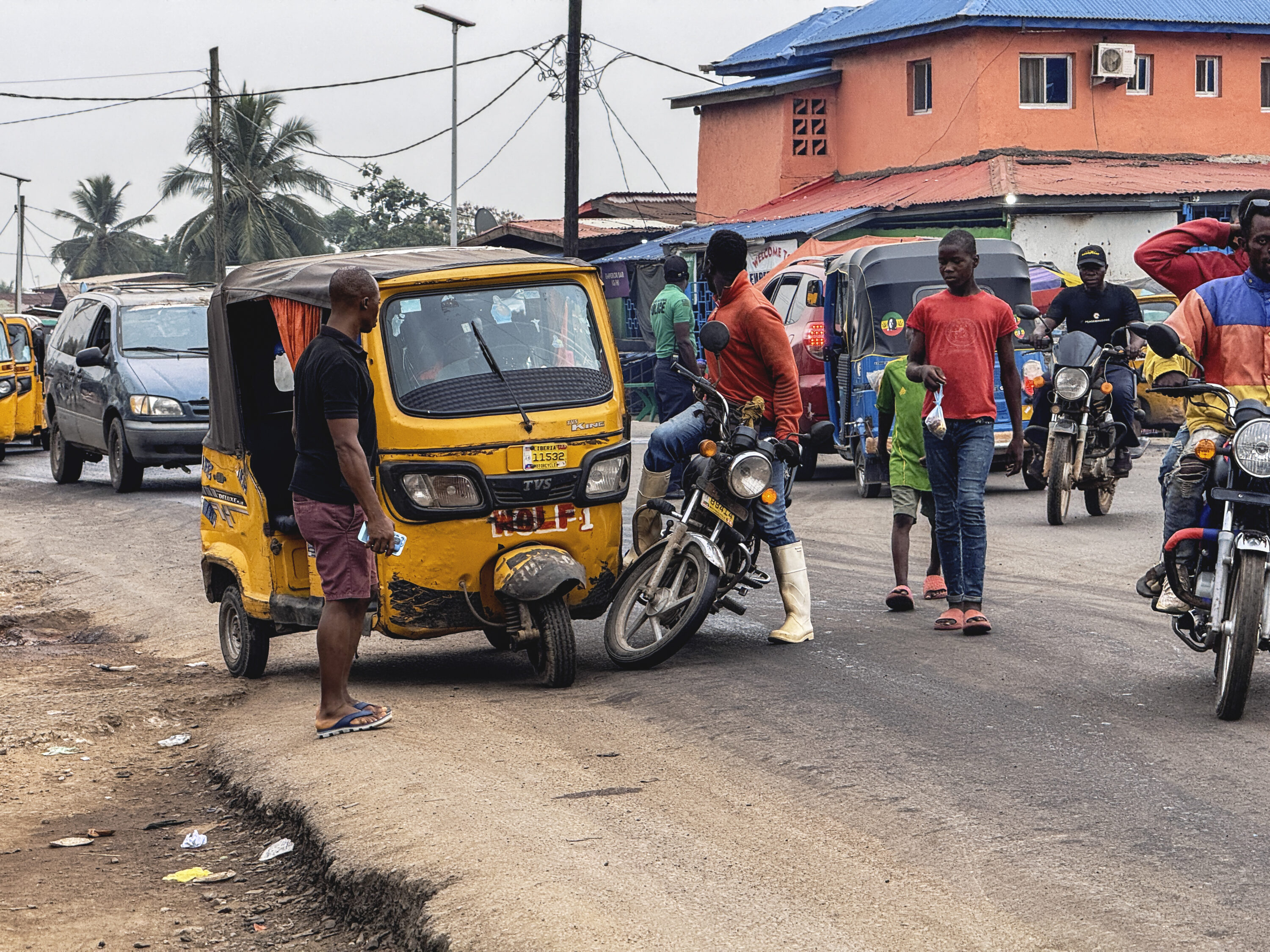
We felt a sense of relief to find a safe place to spend the night after a long day. Suddenly, we were inside the church, where the choir began singing to welcome us. It was an amazingly warm moment. Afterward, we enjoyed a warm shower, cooked some pasta, and then went to sleep.
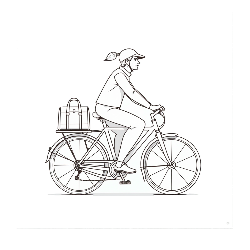

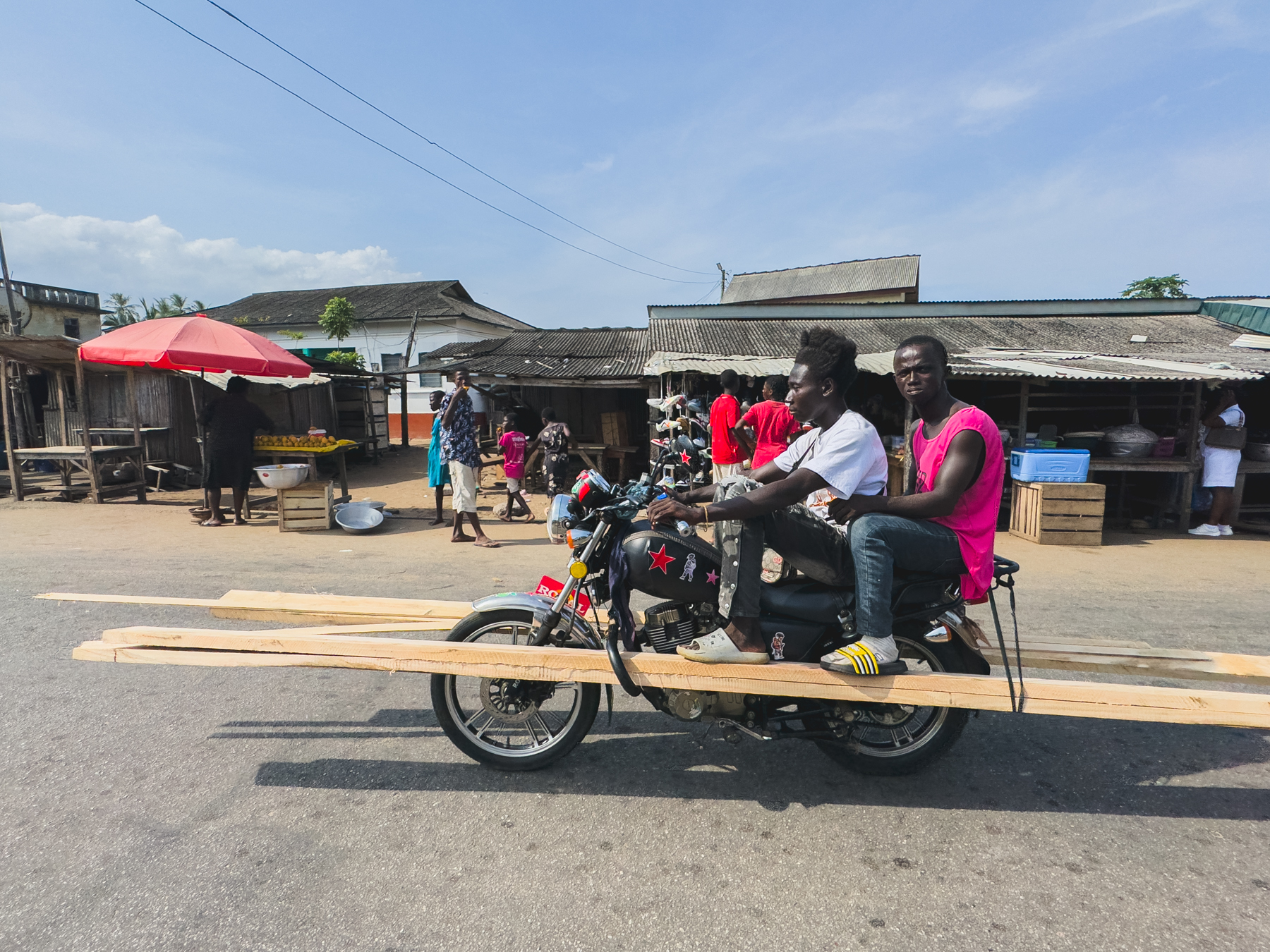

Leave a Reply